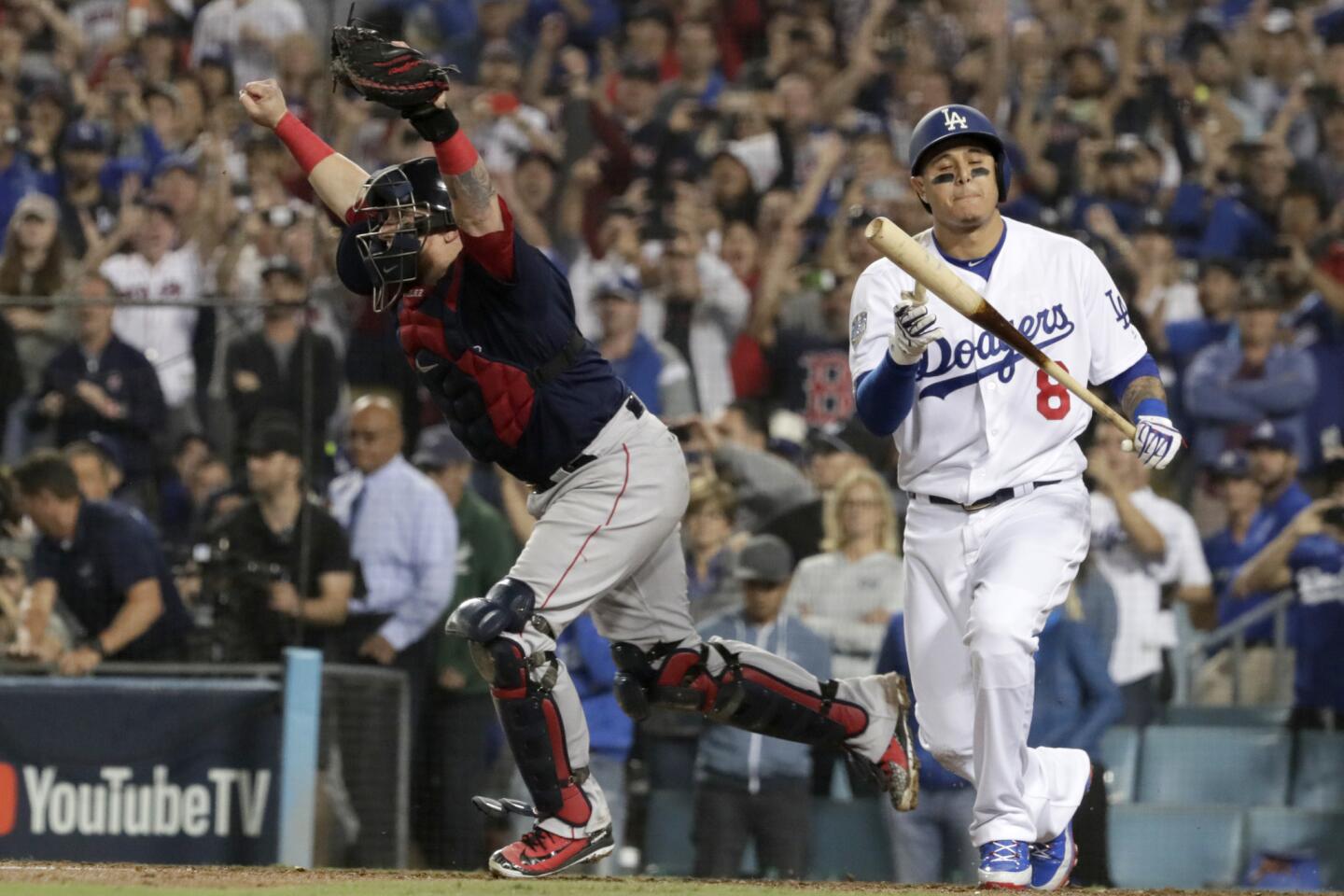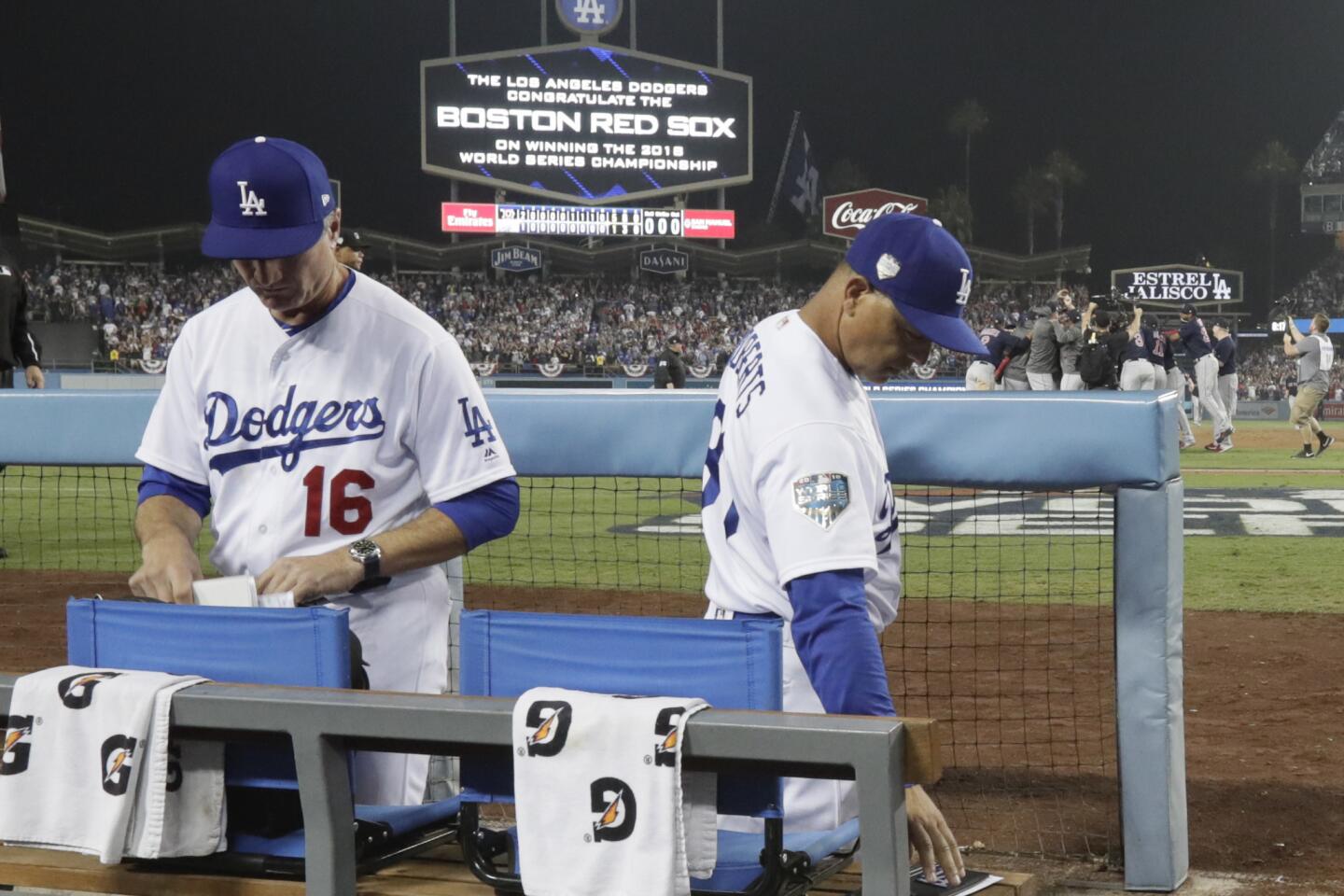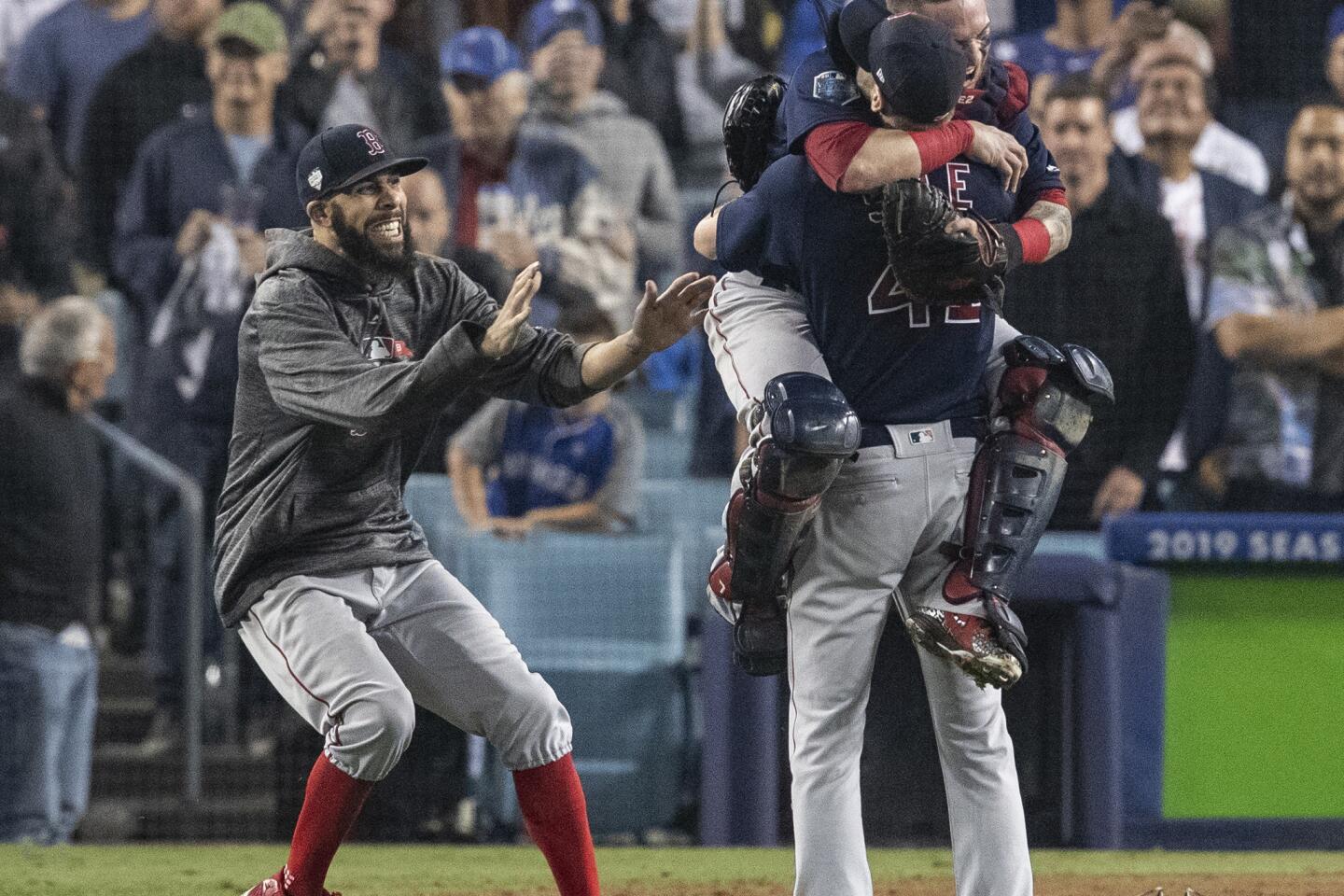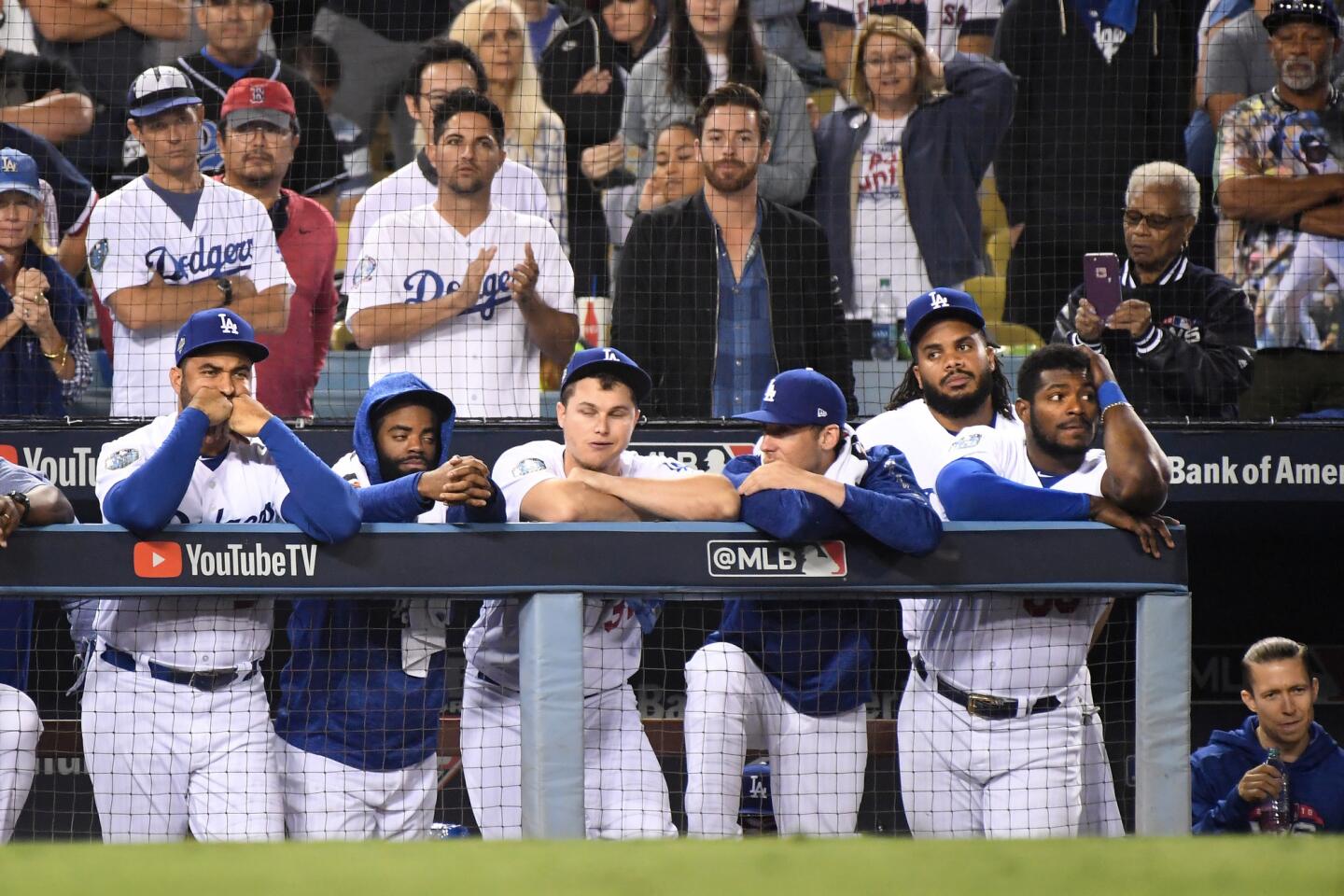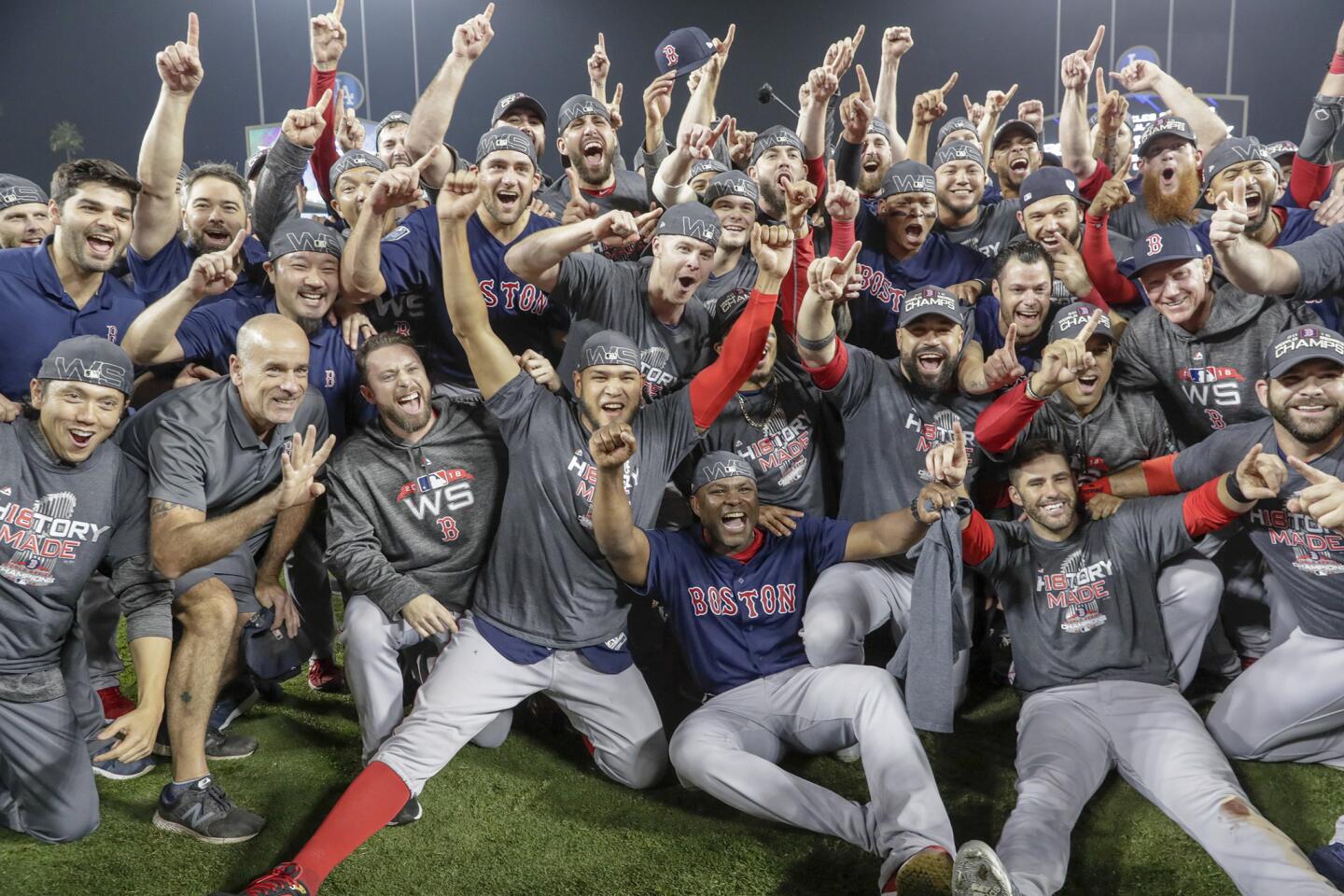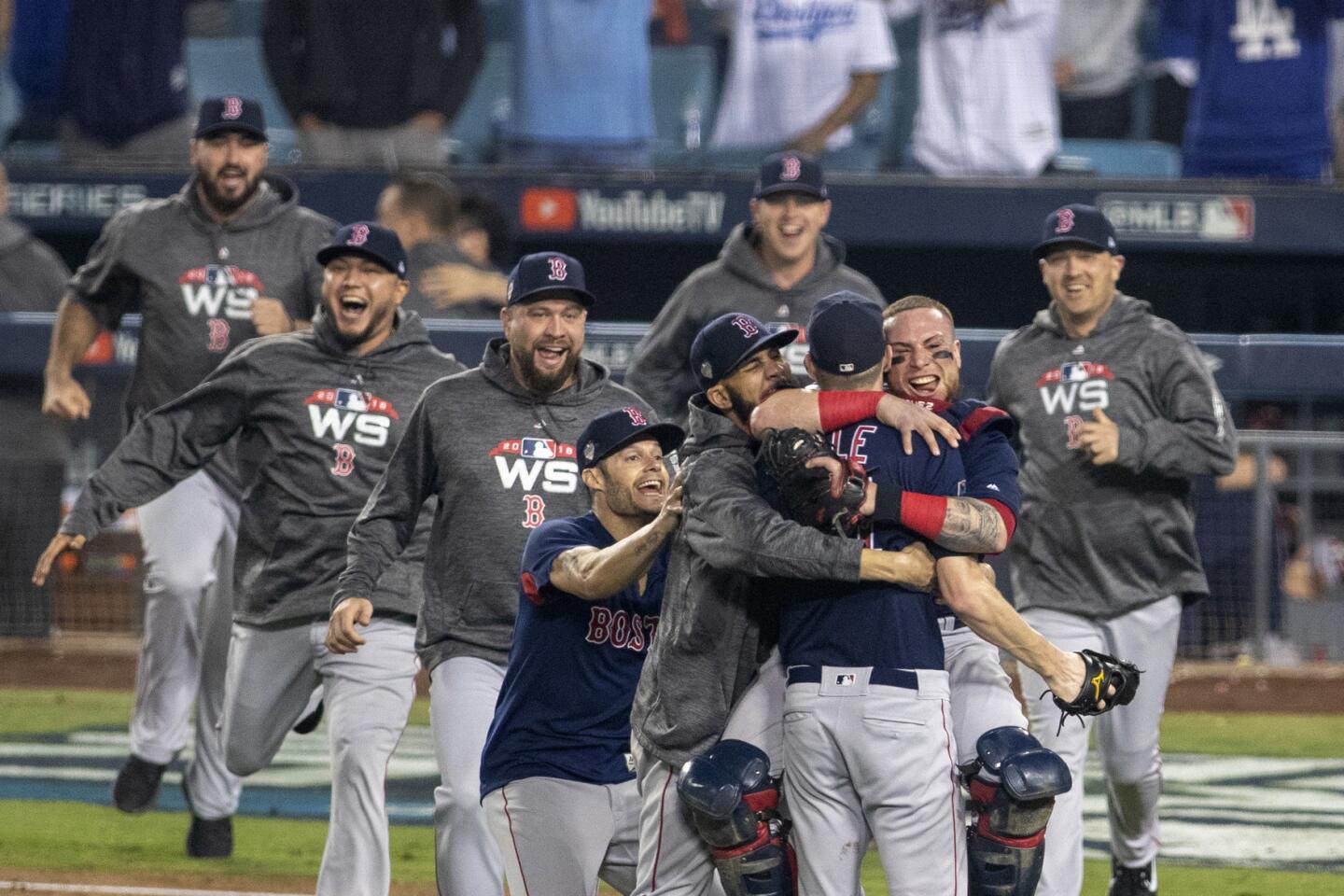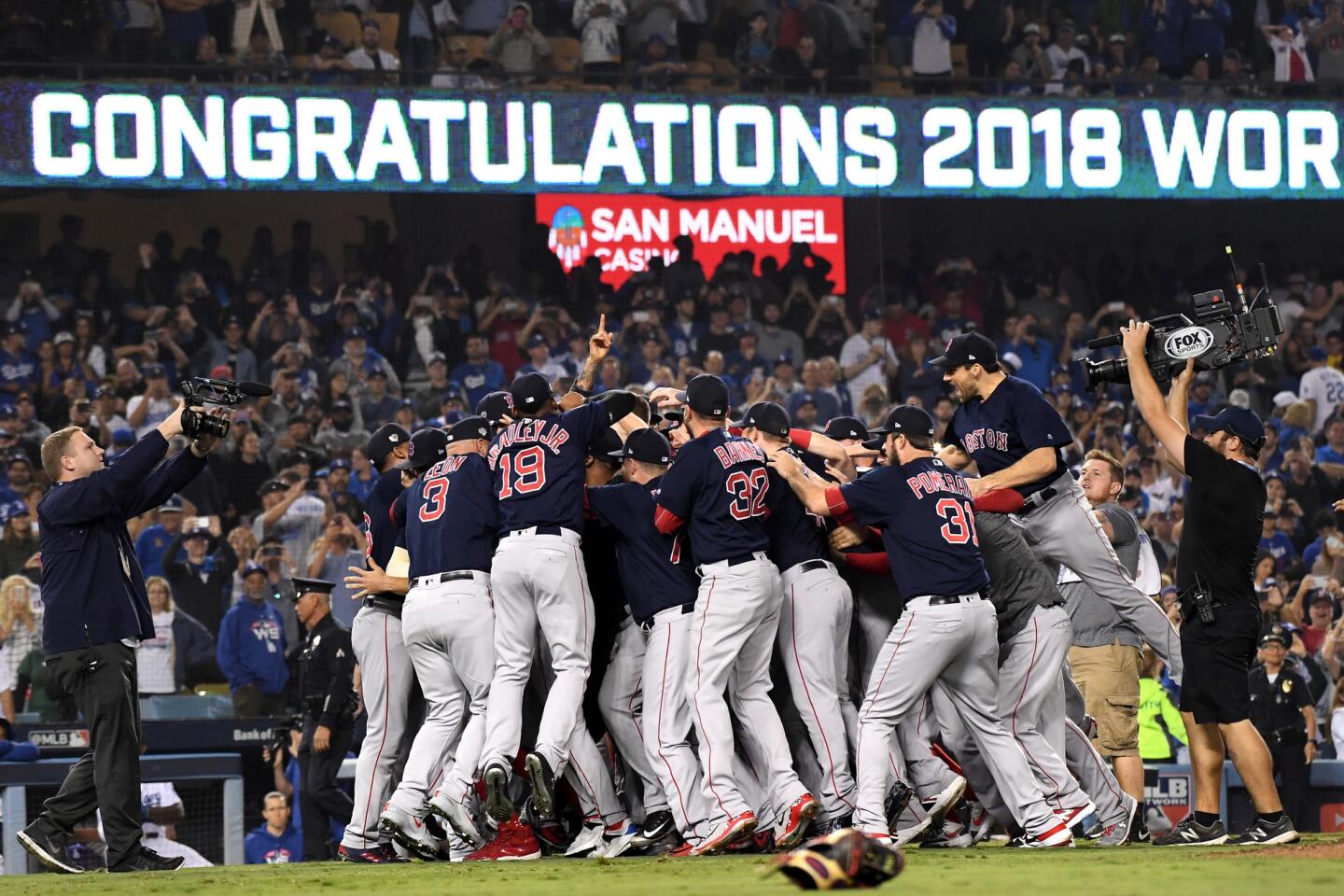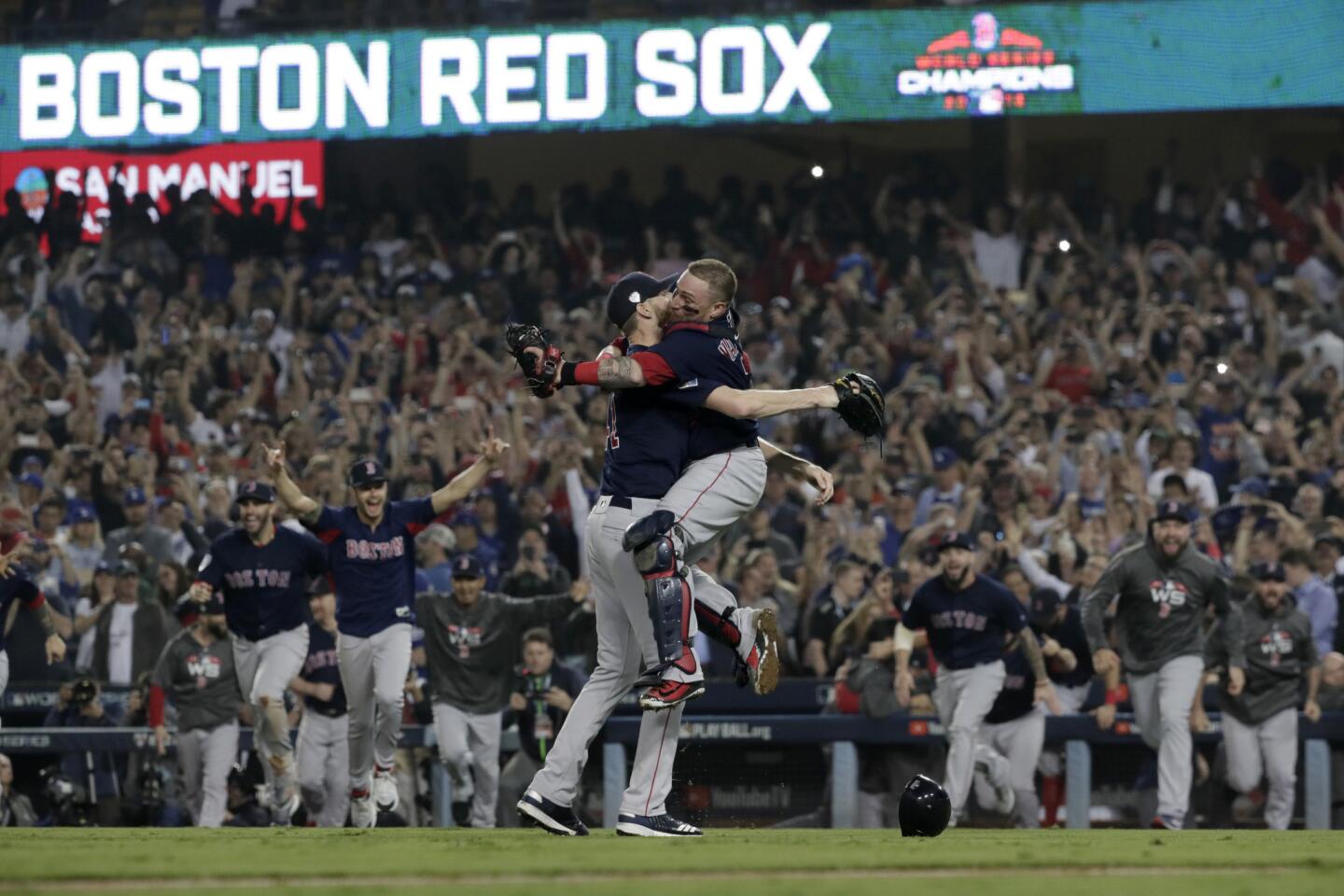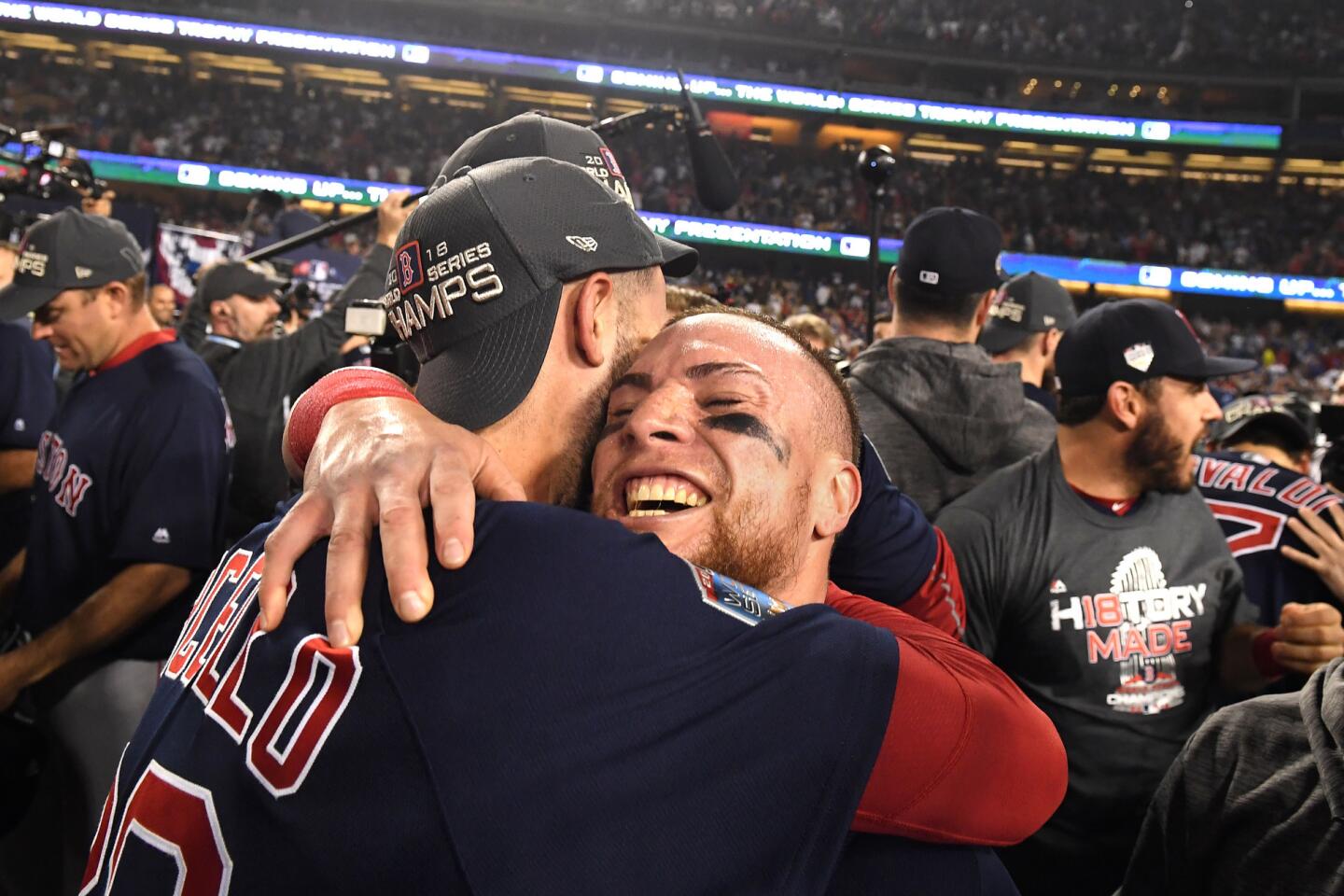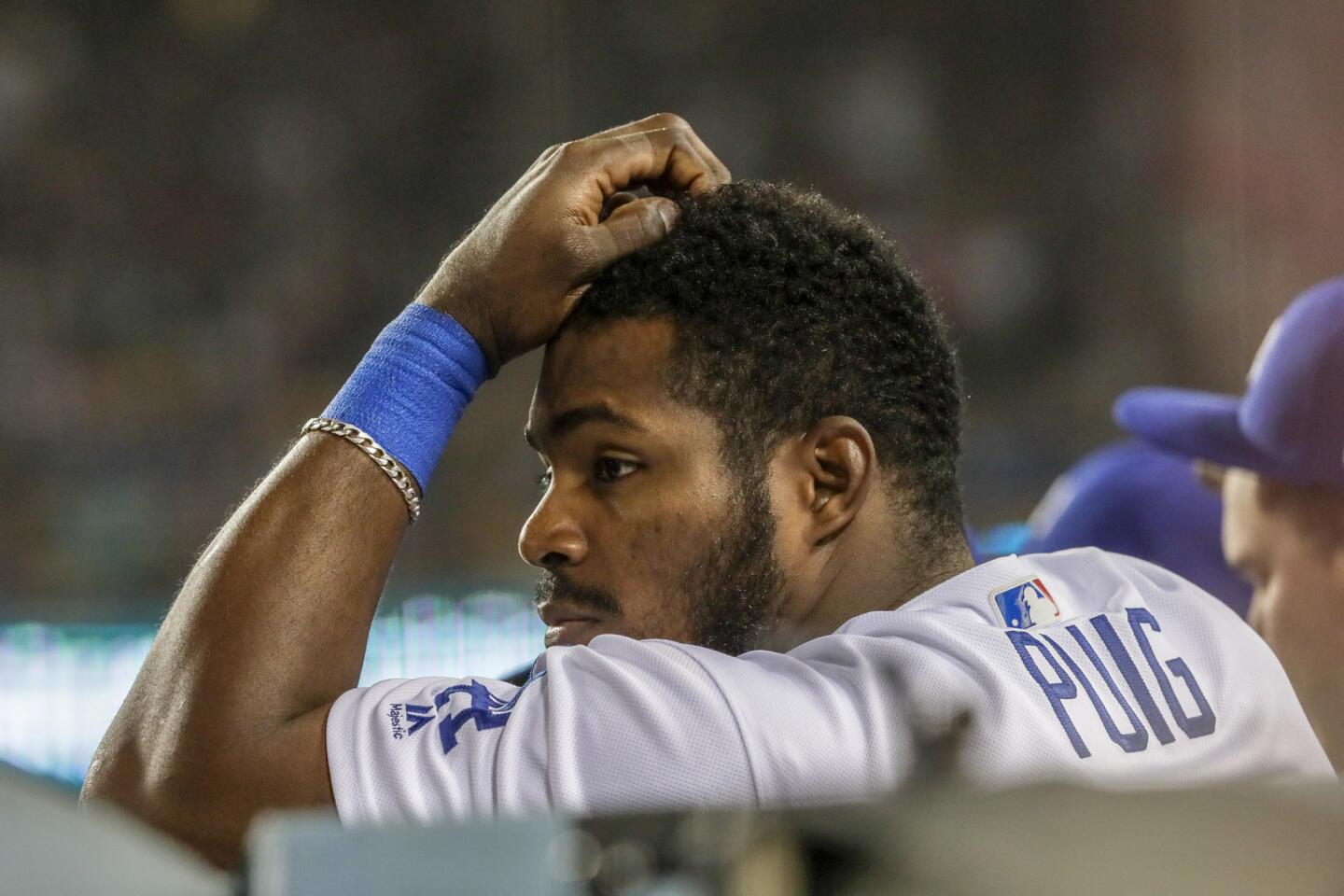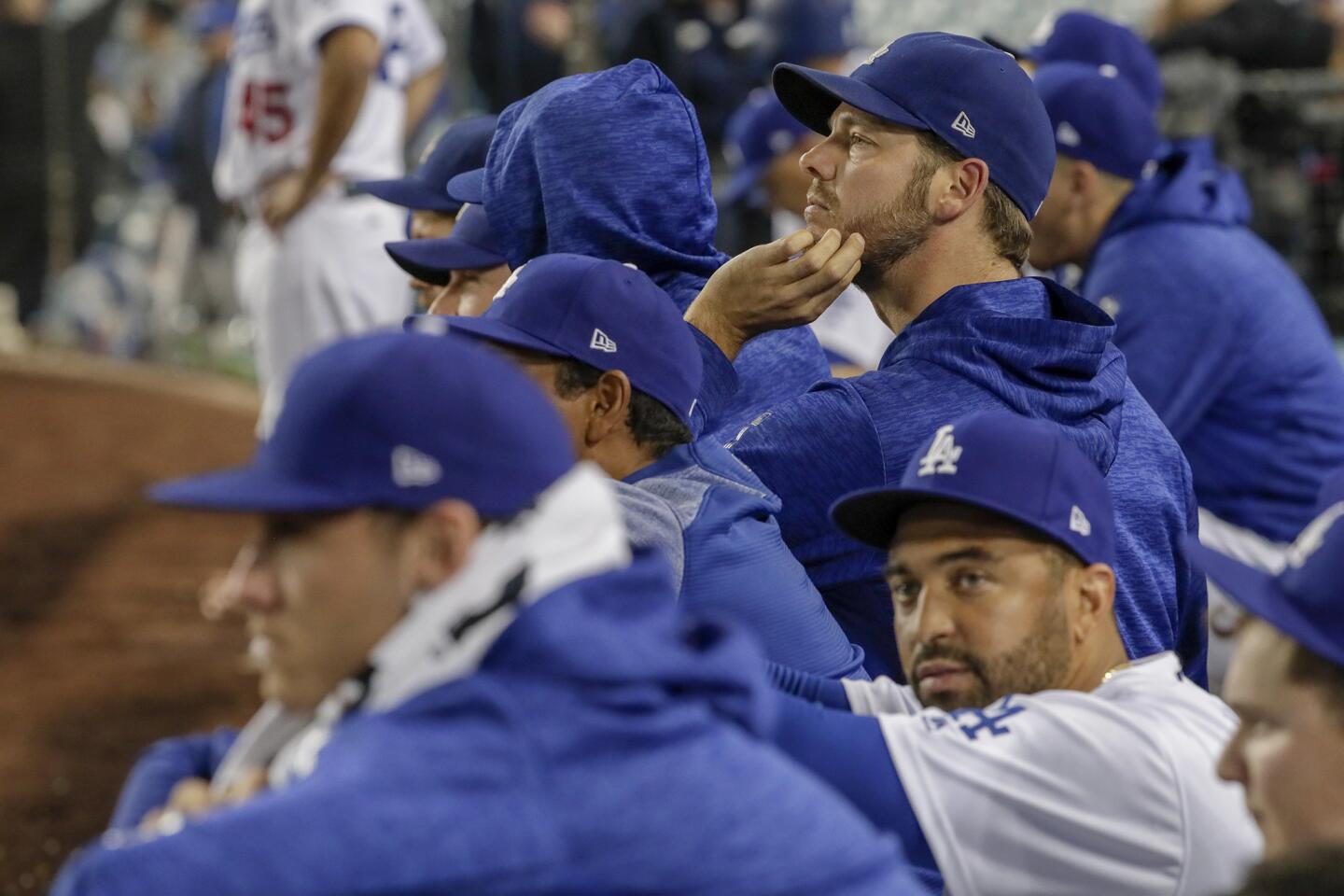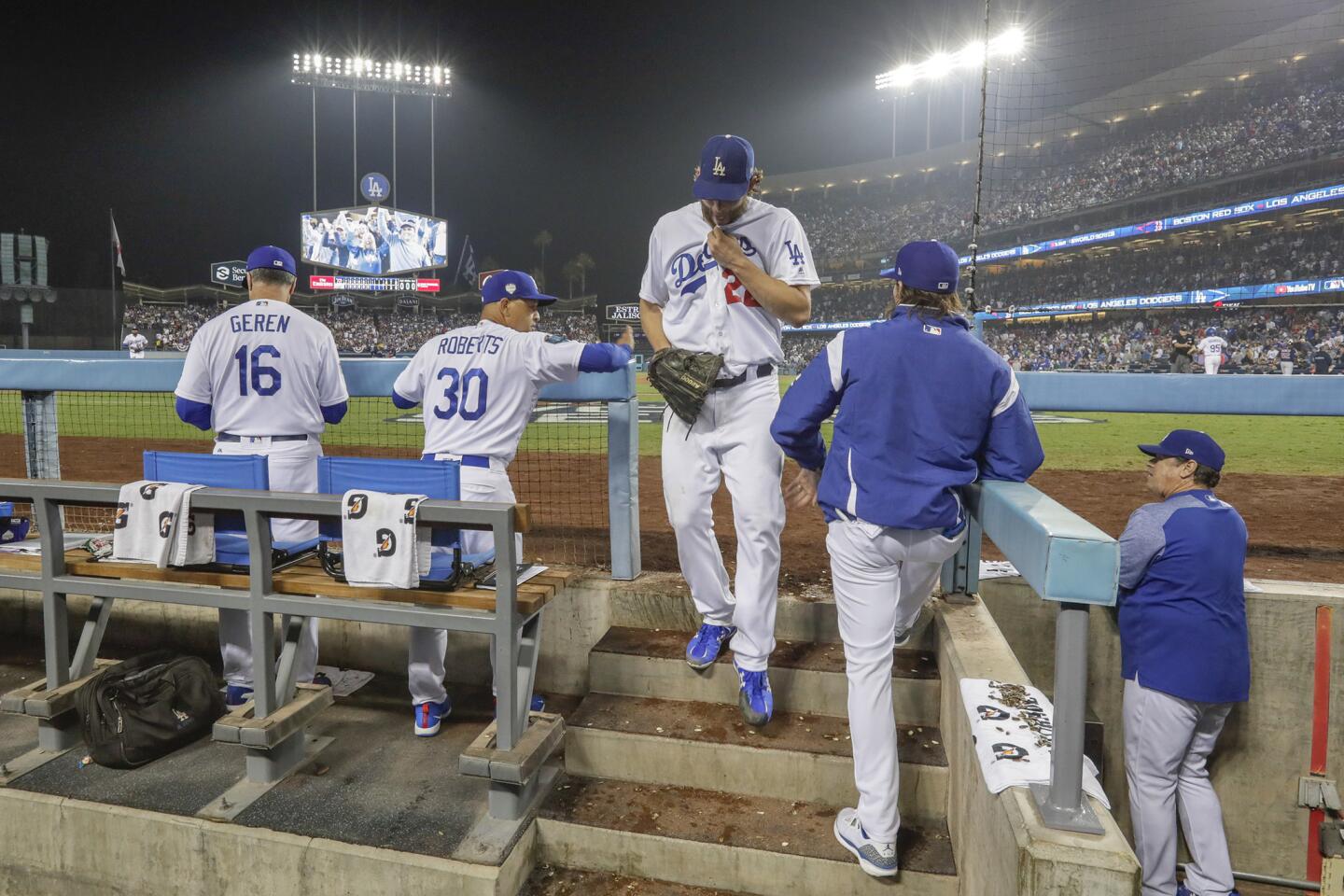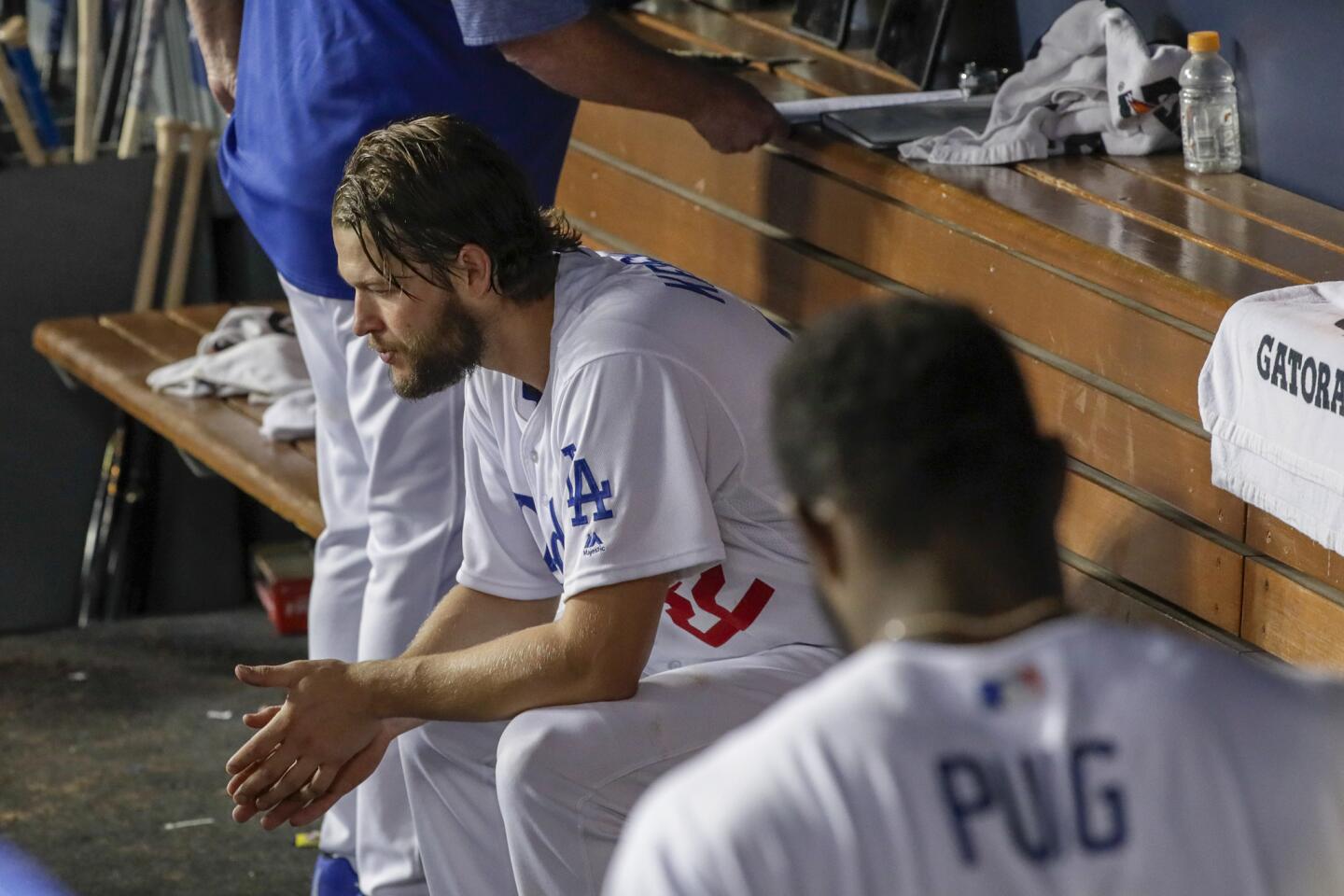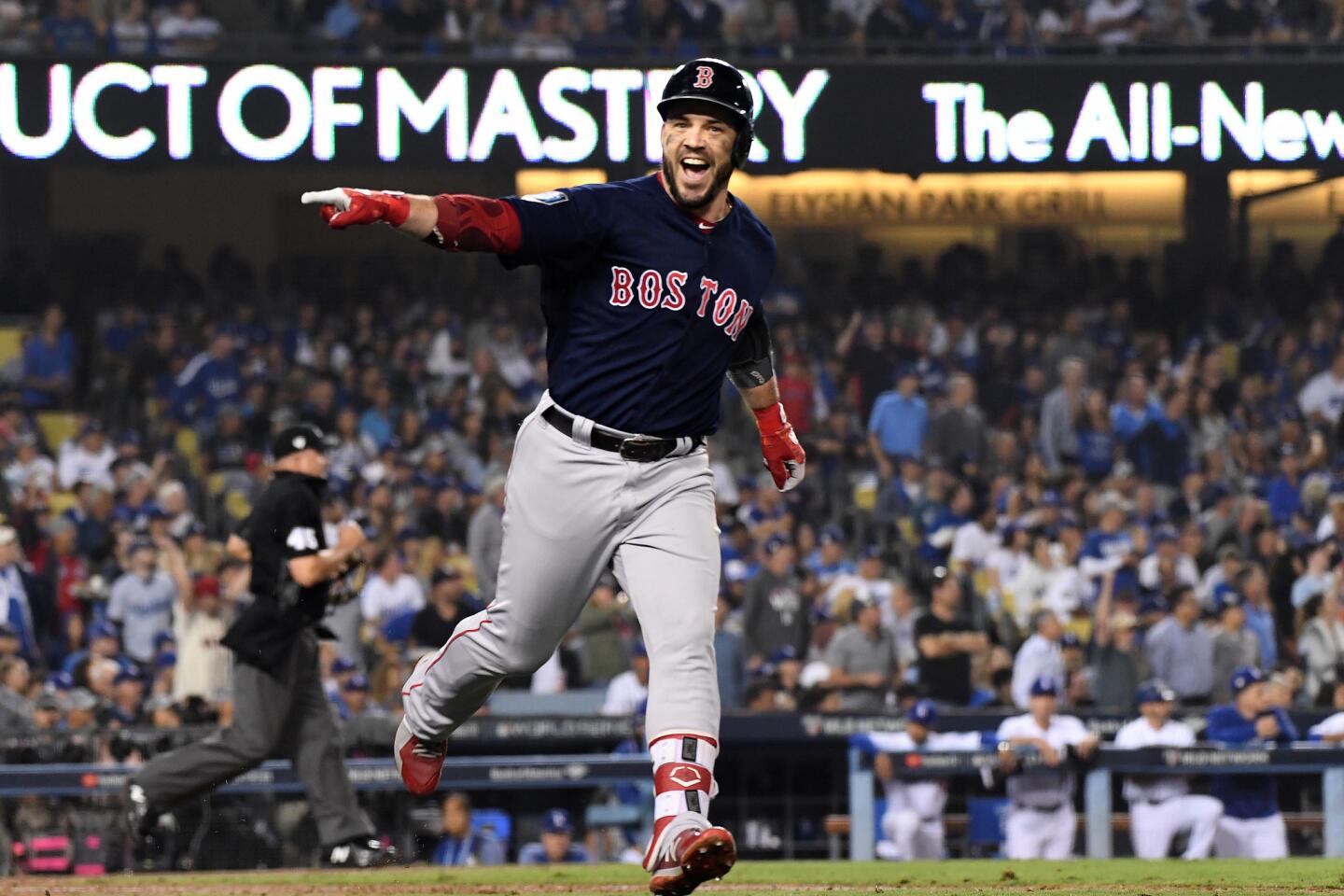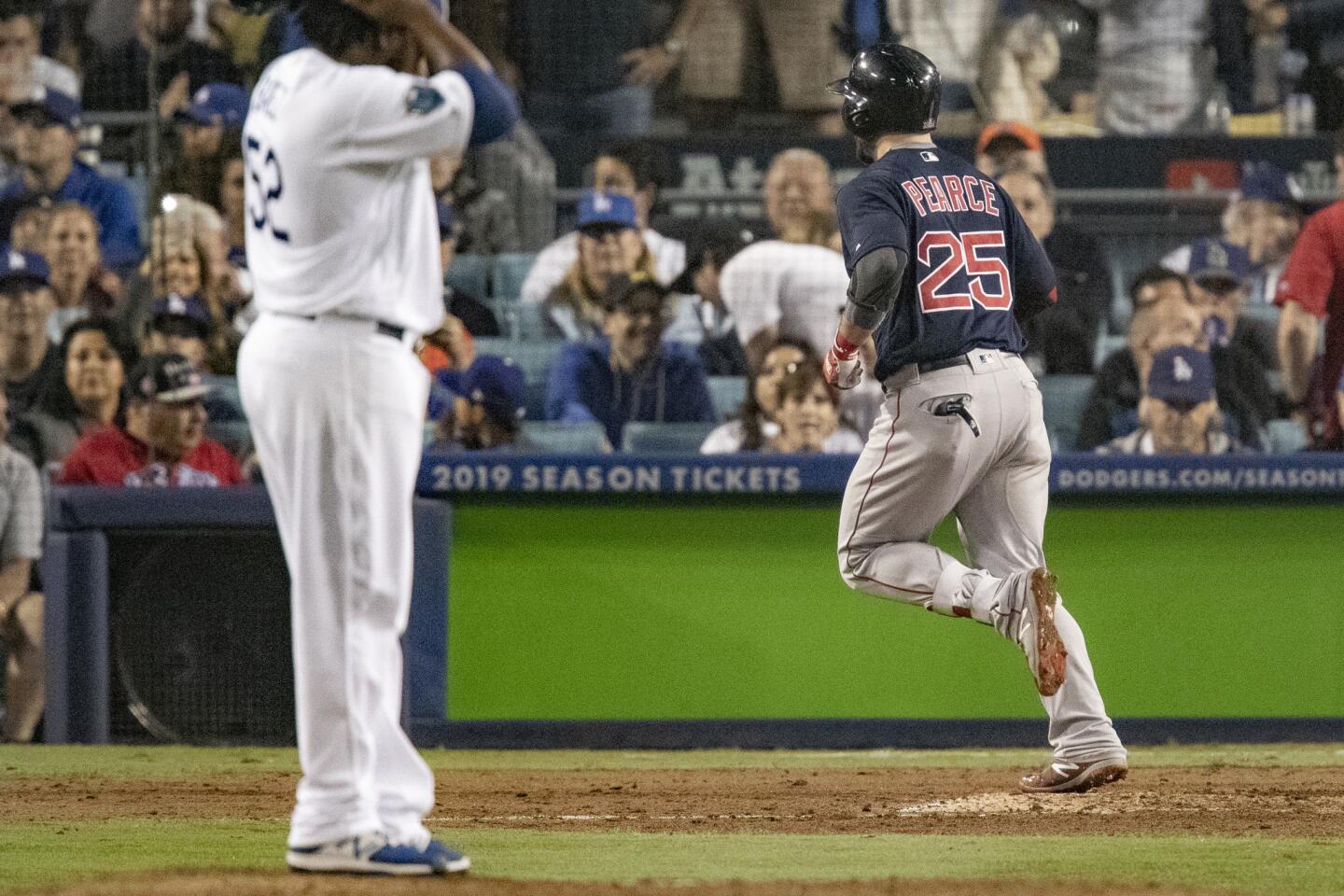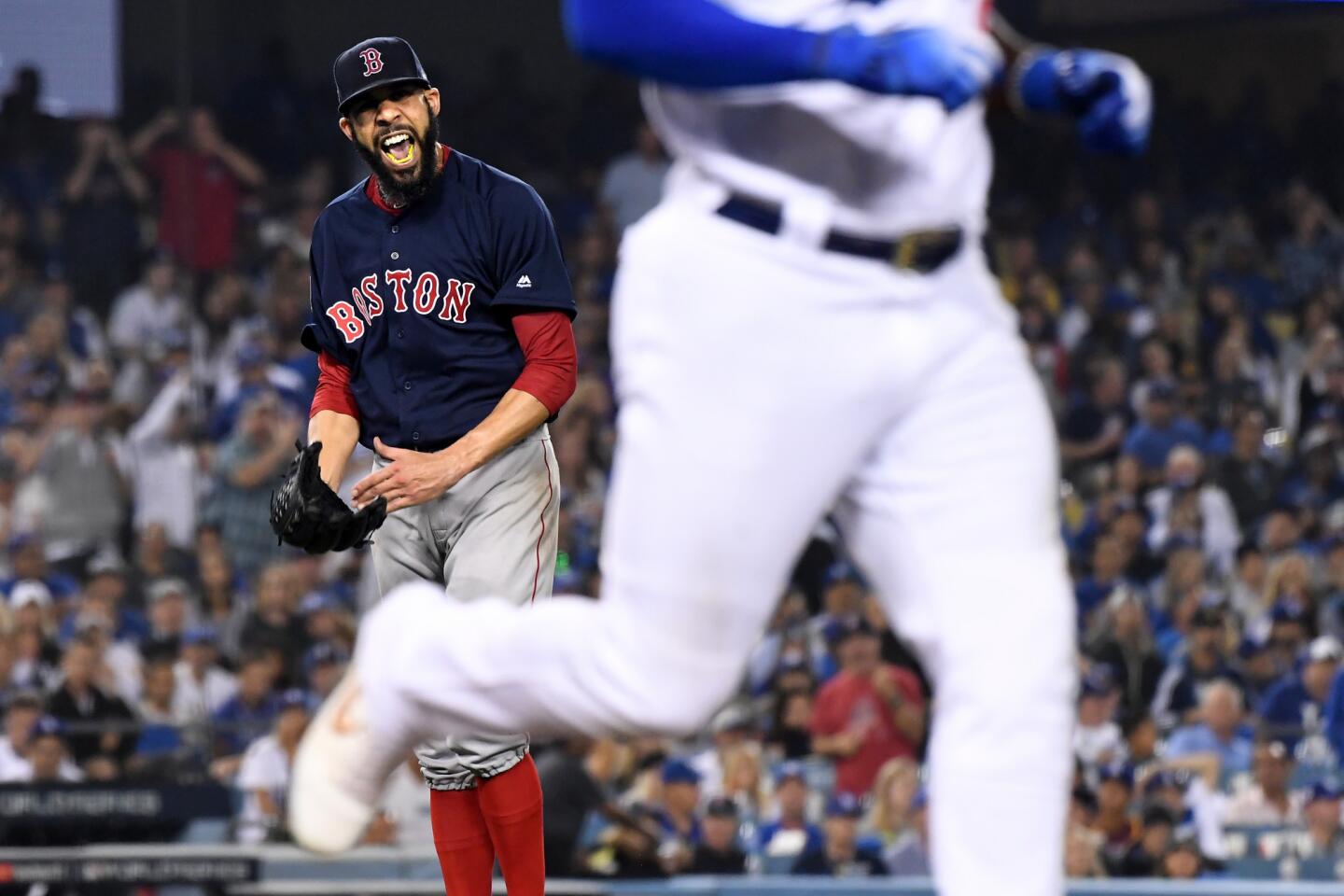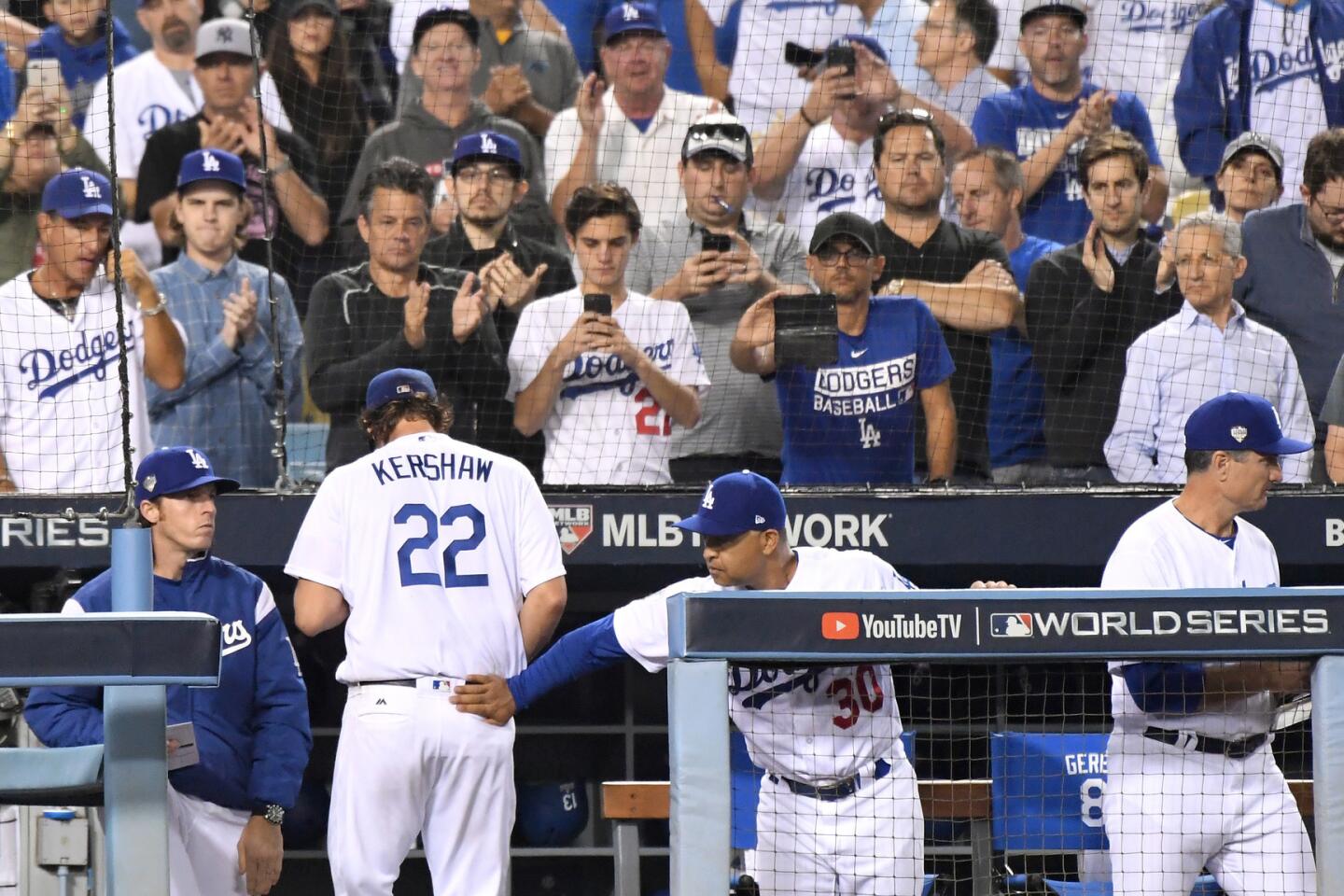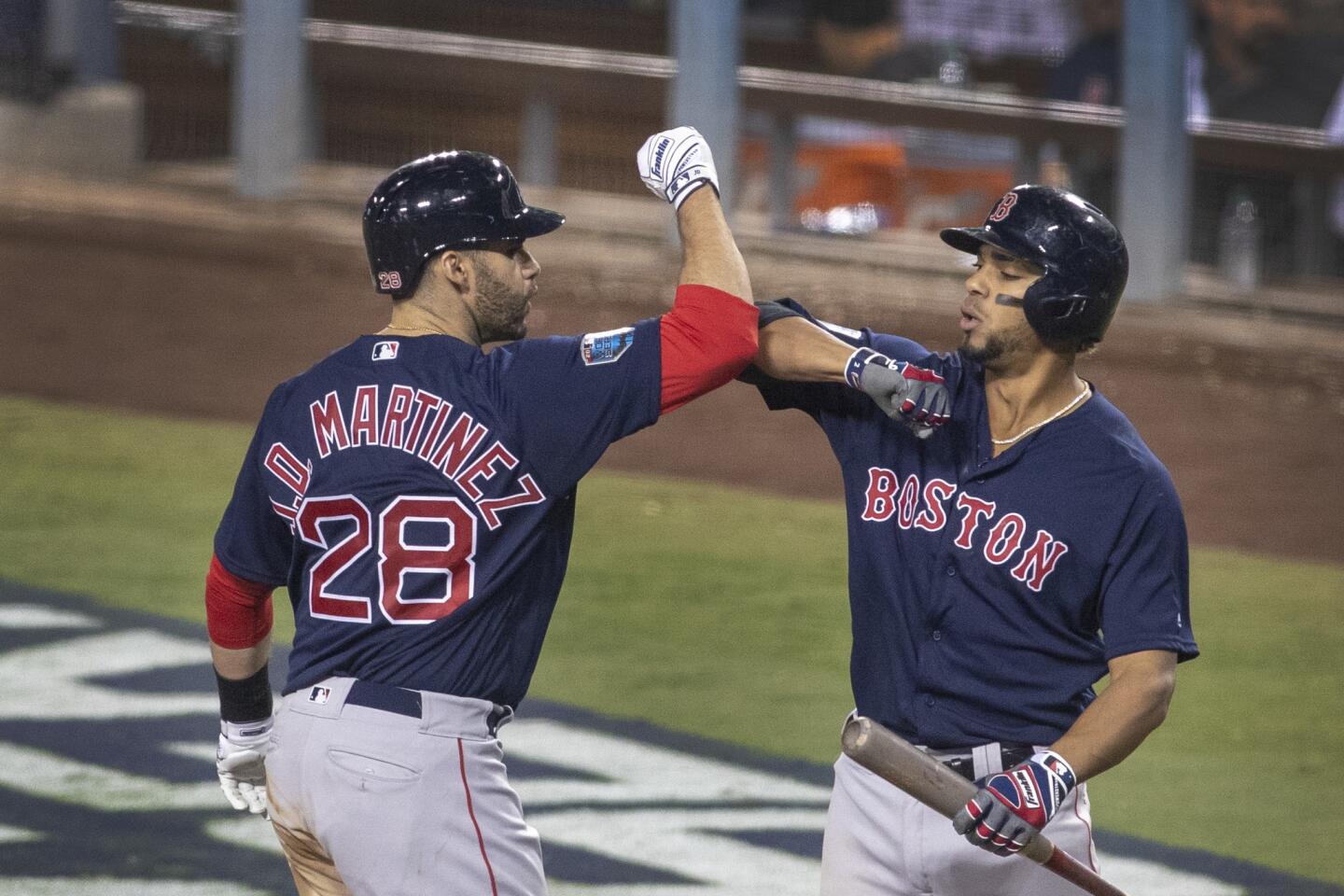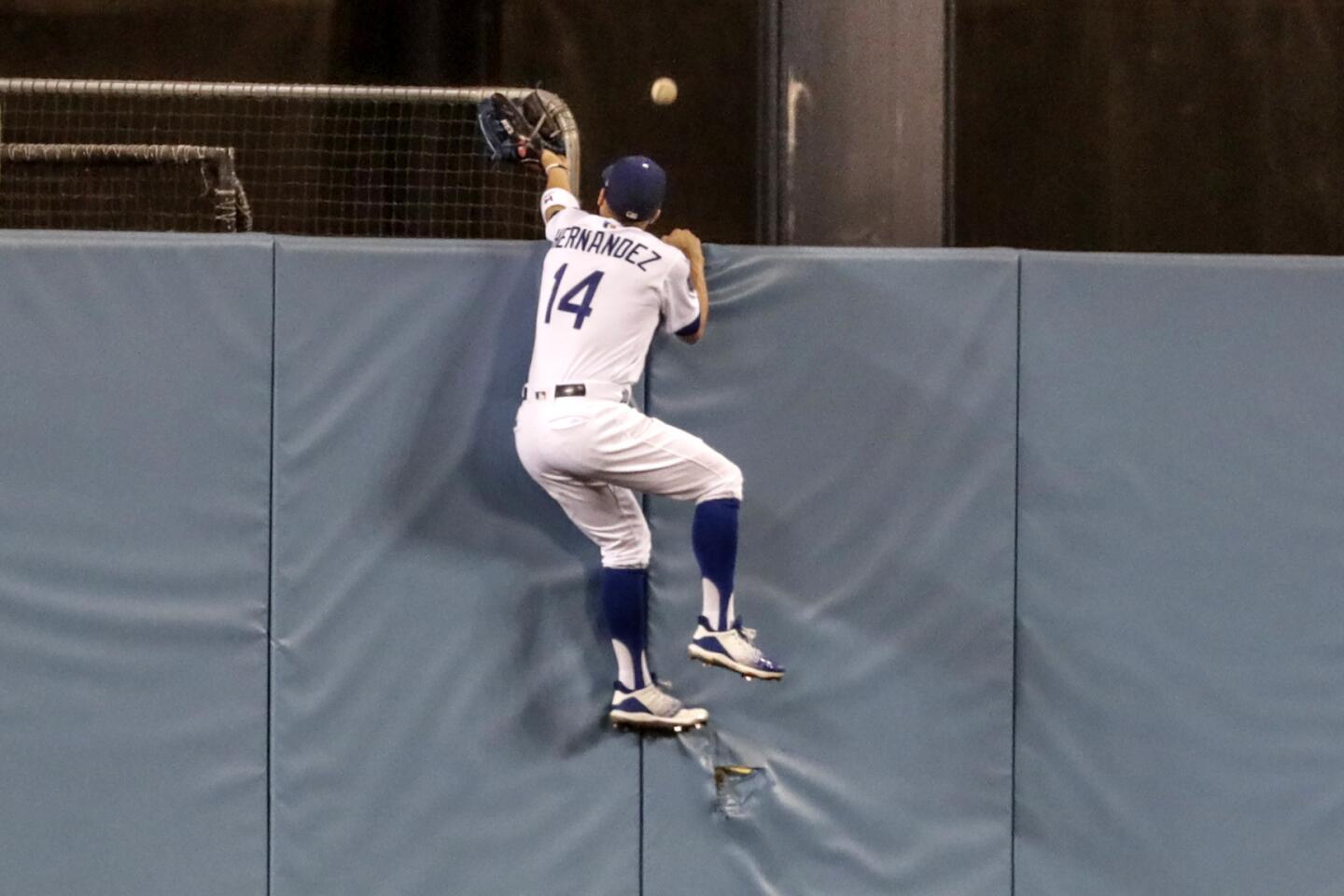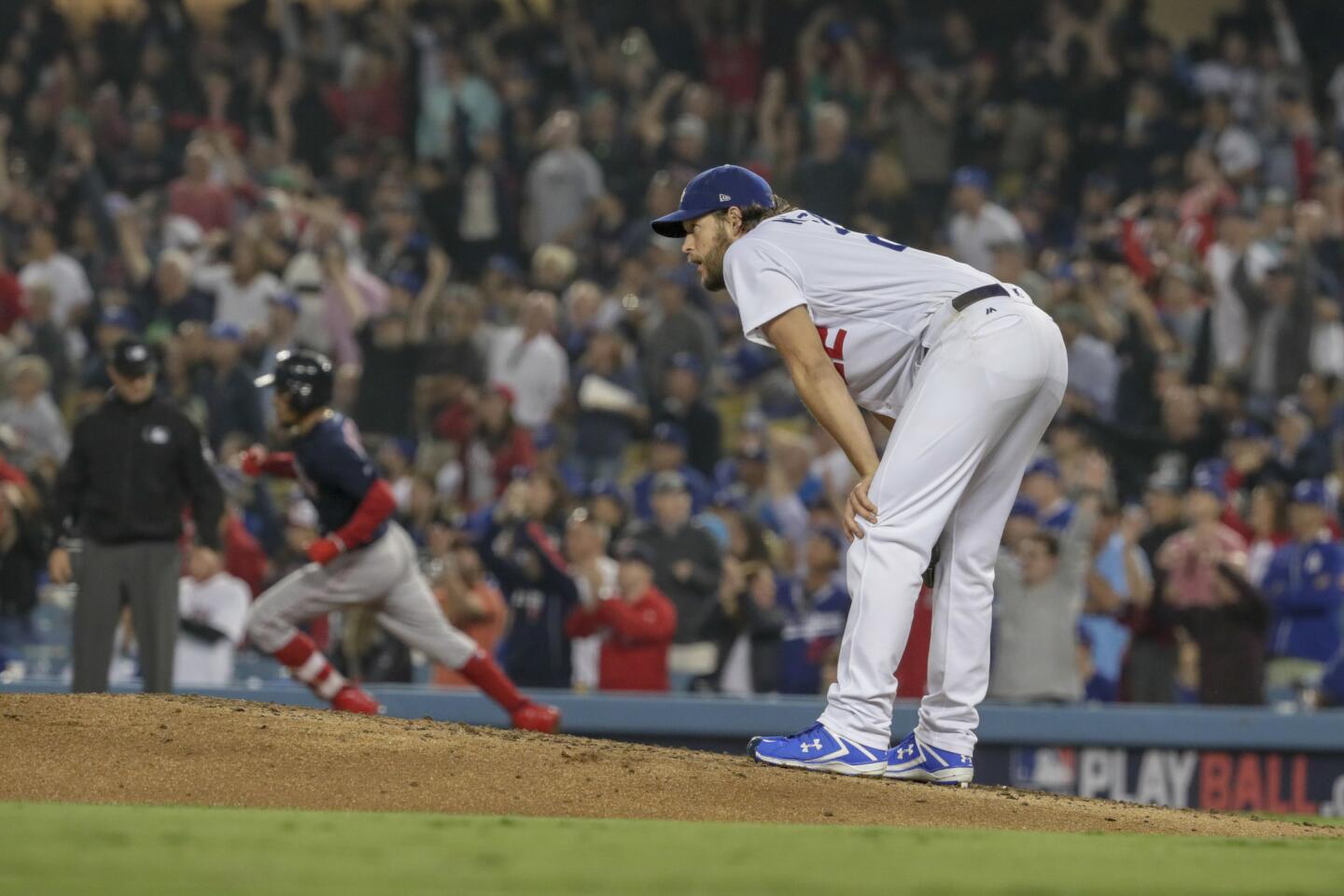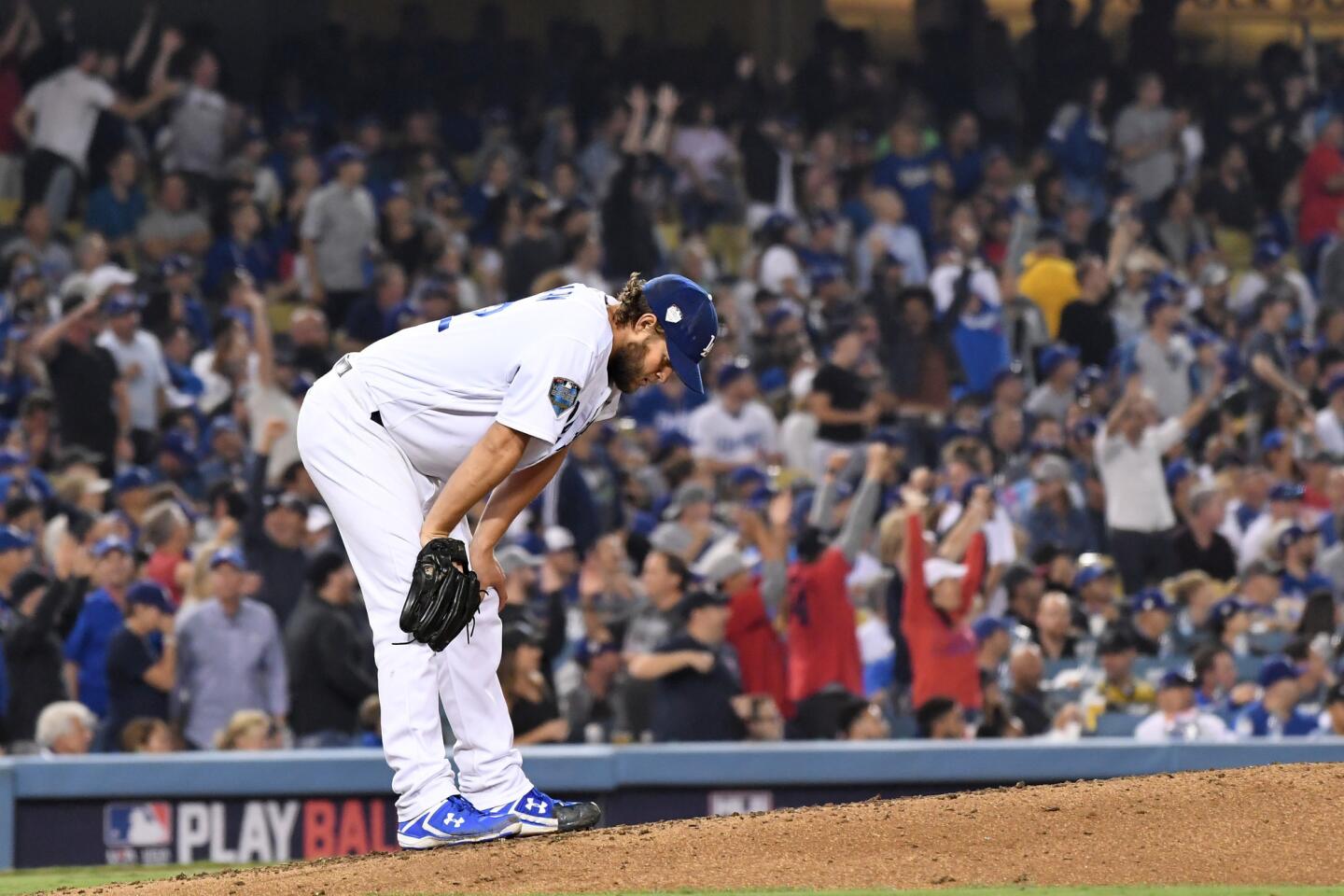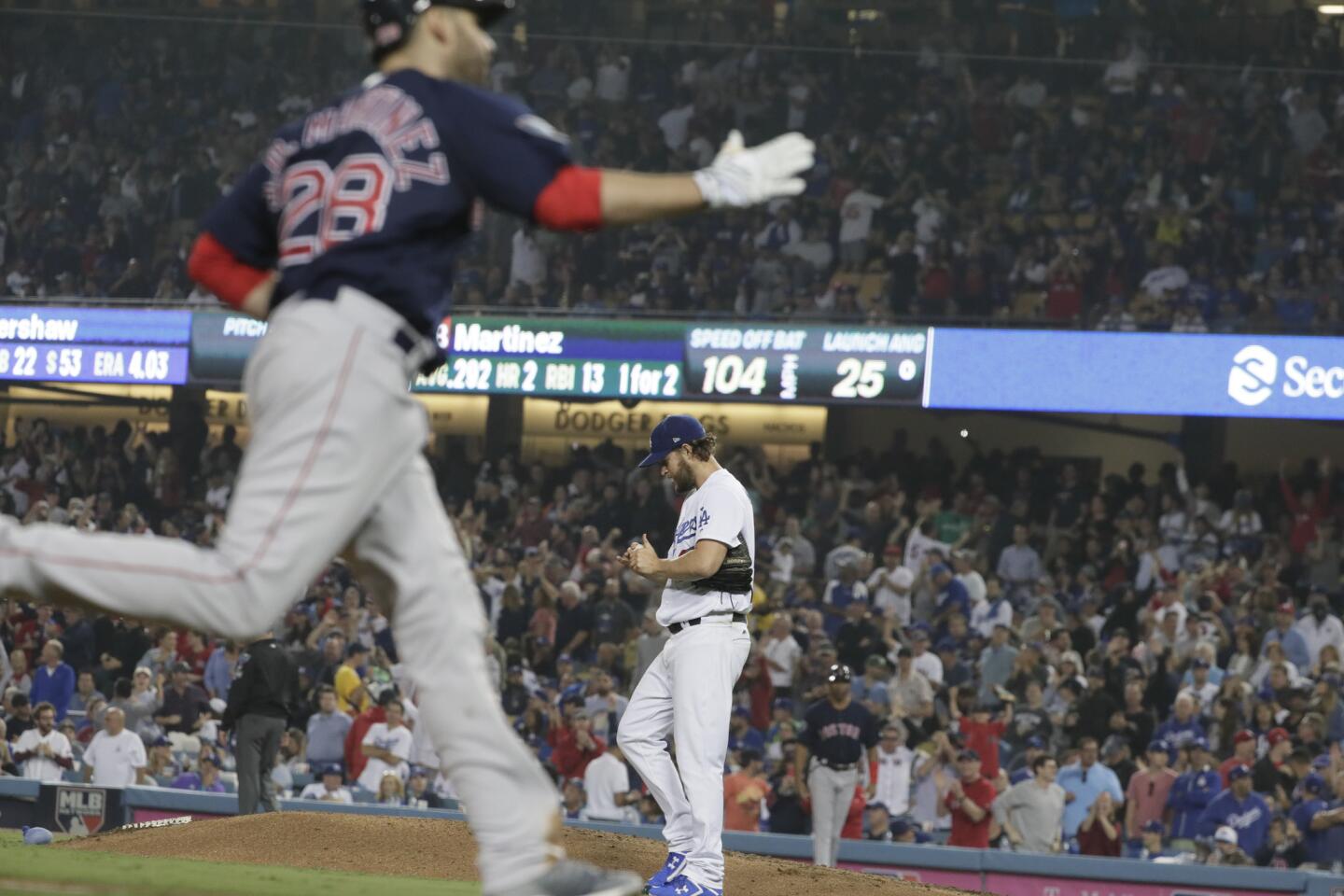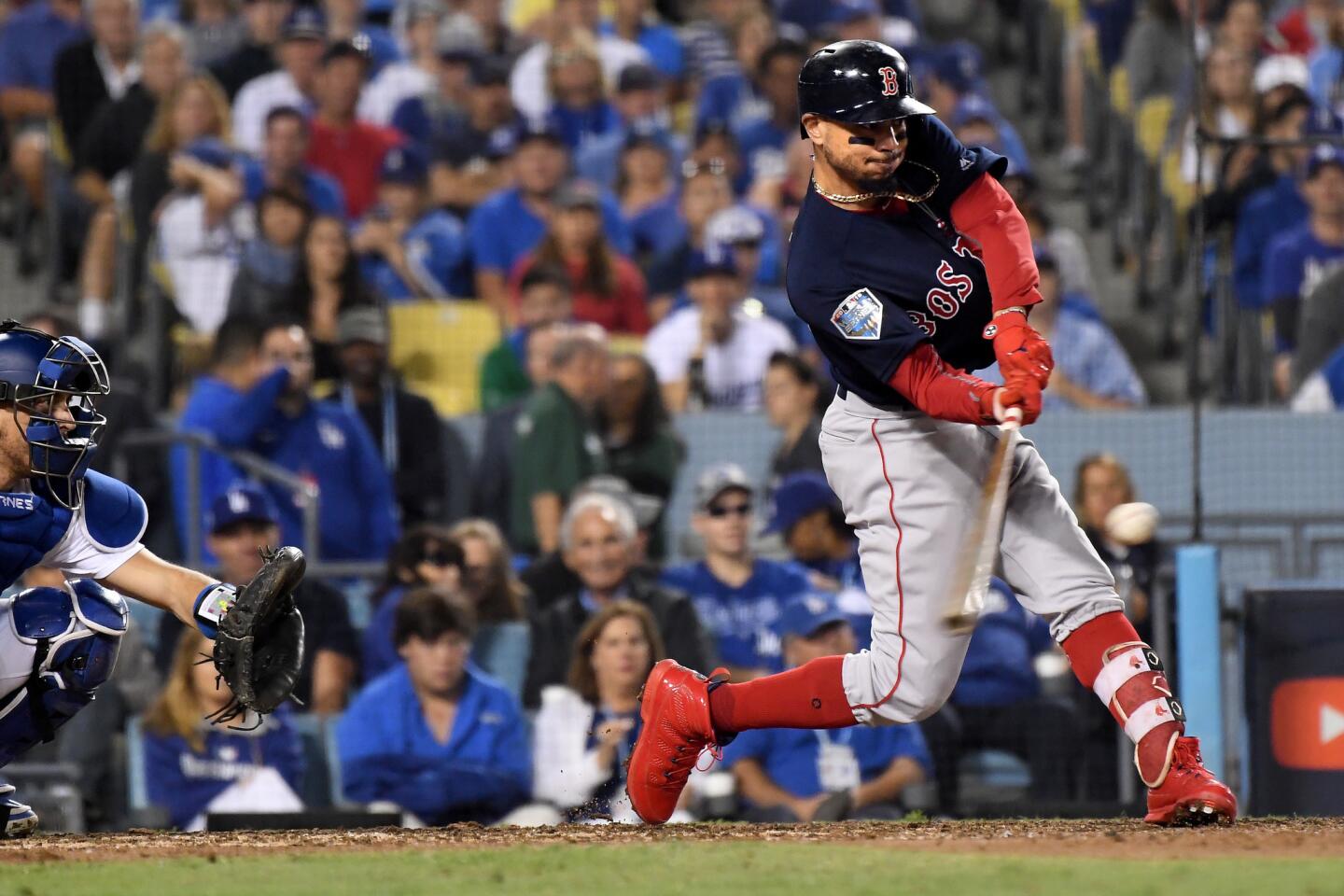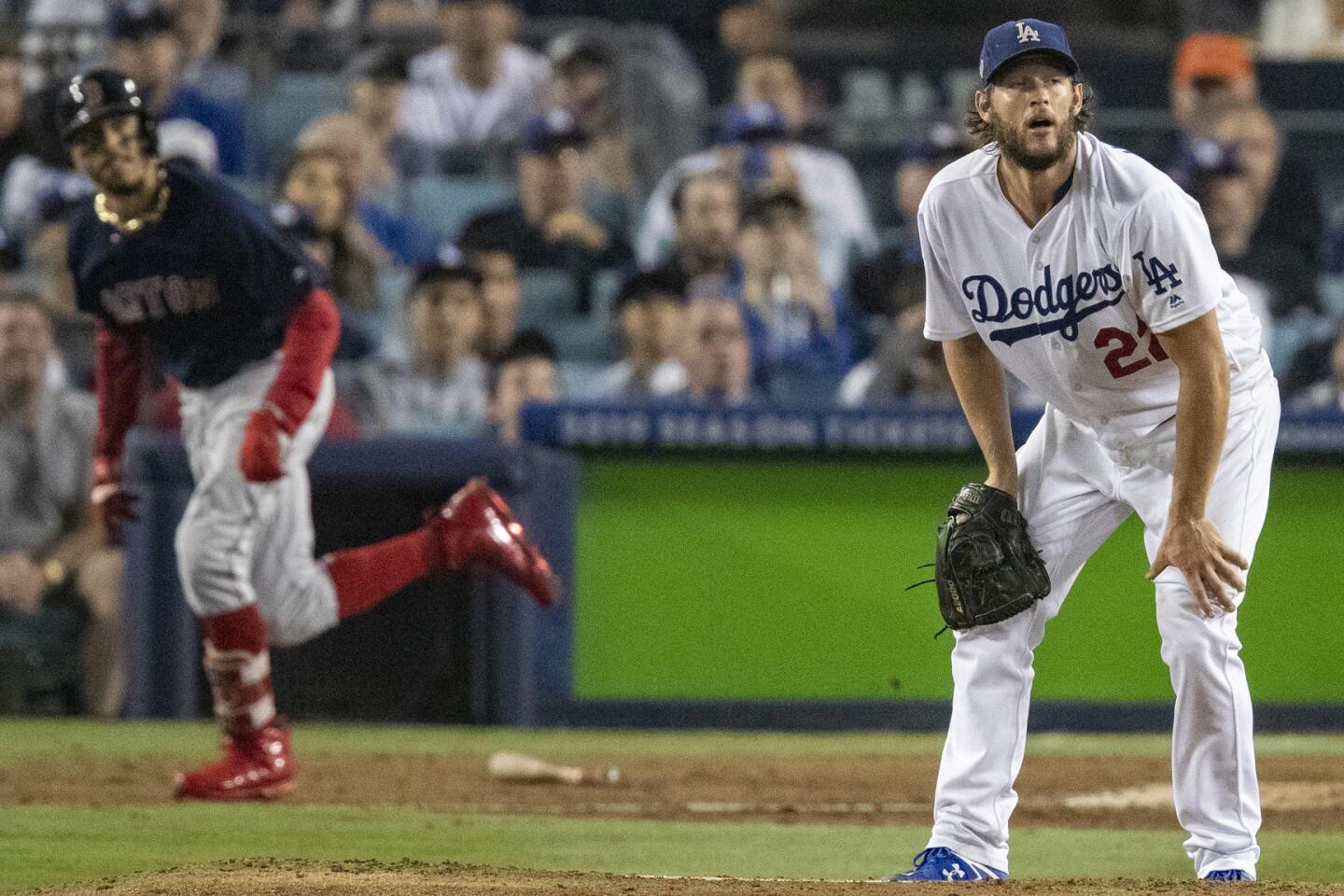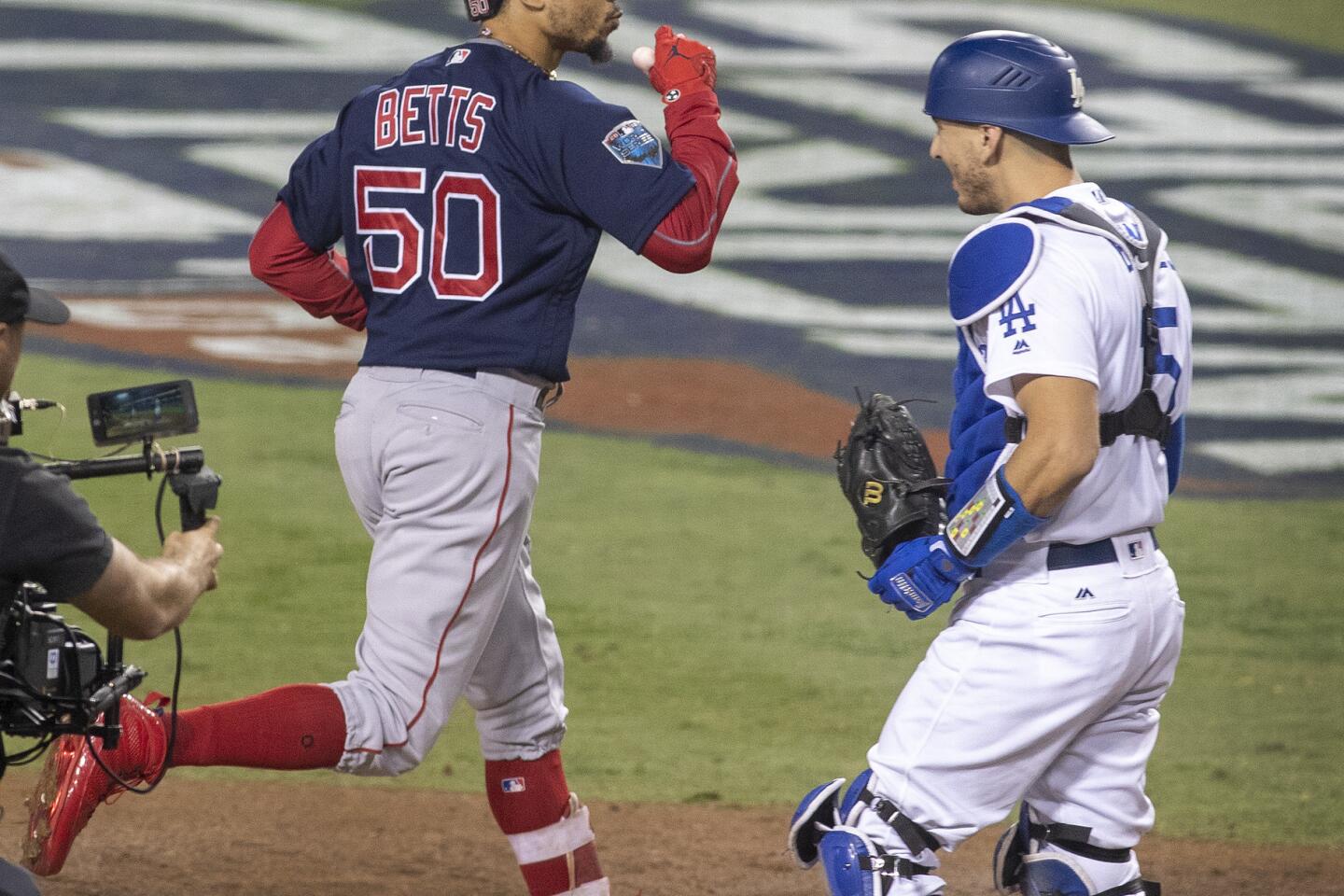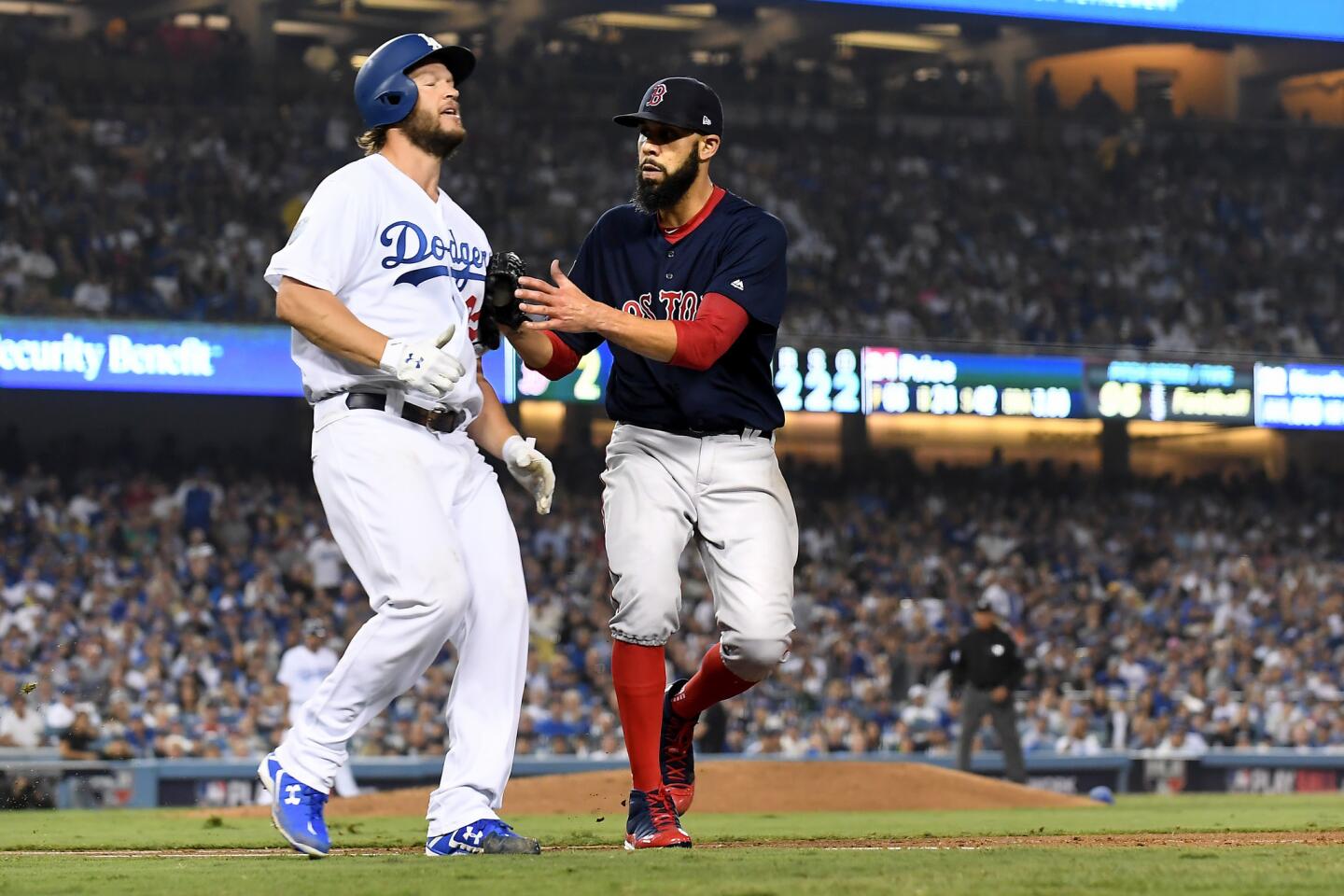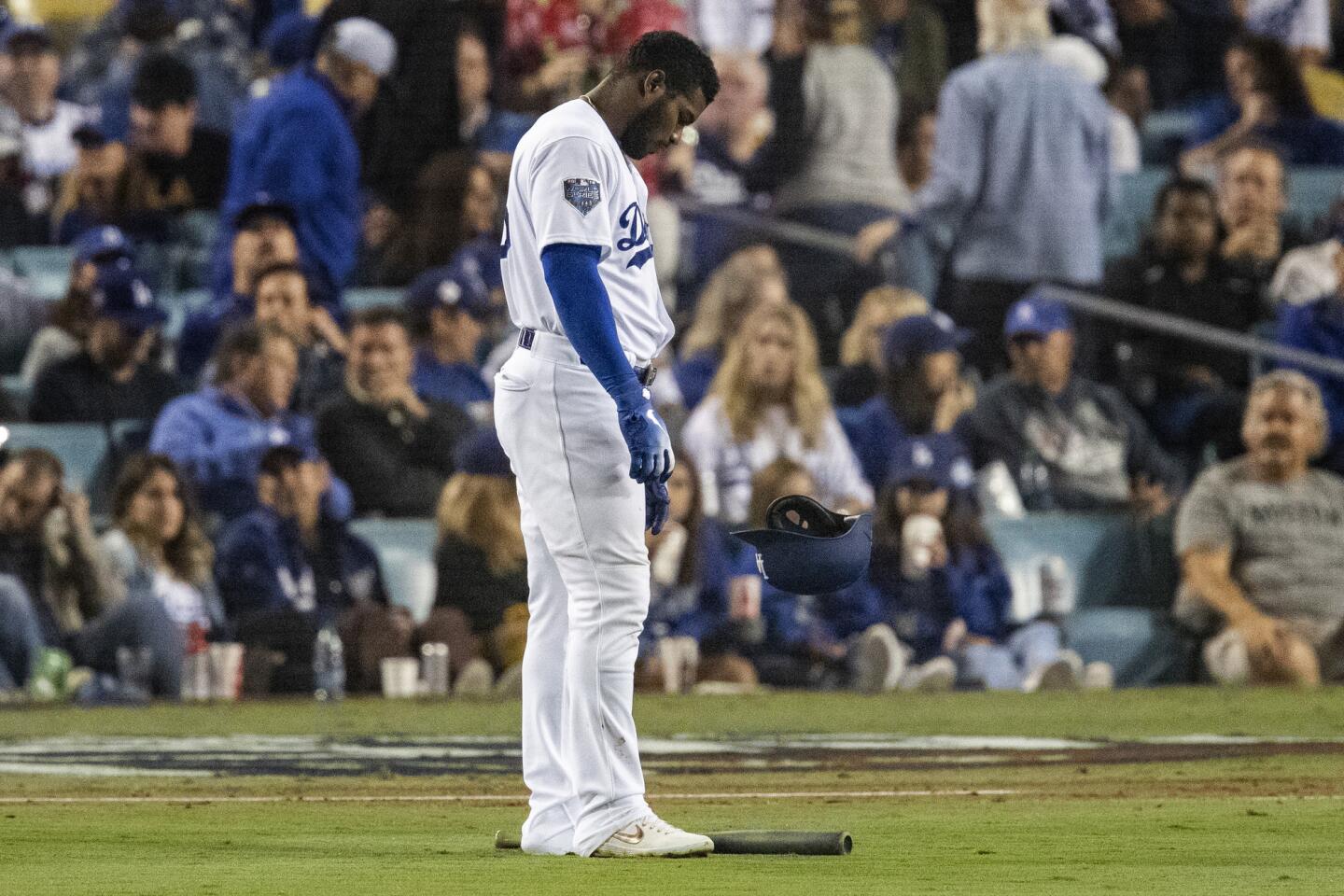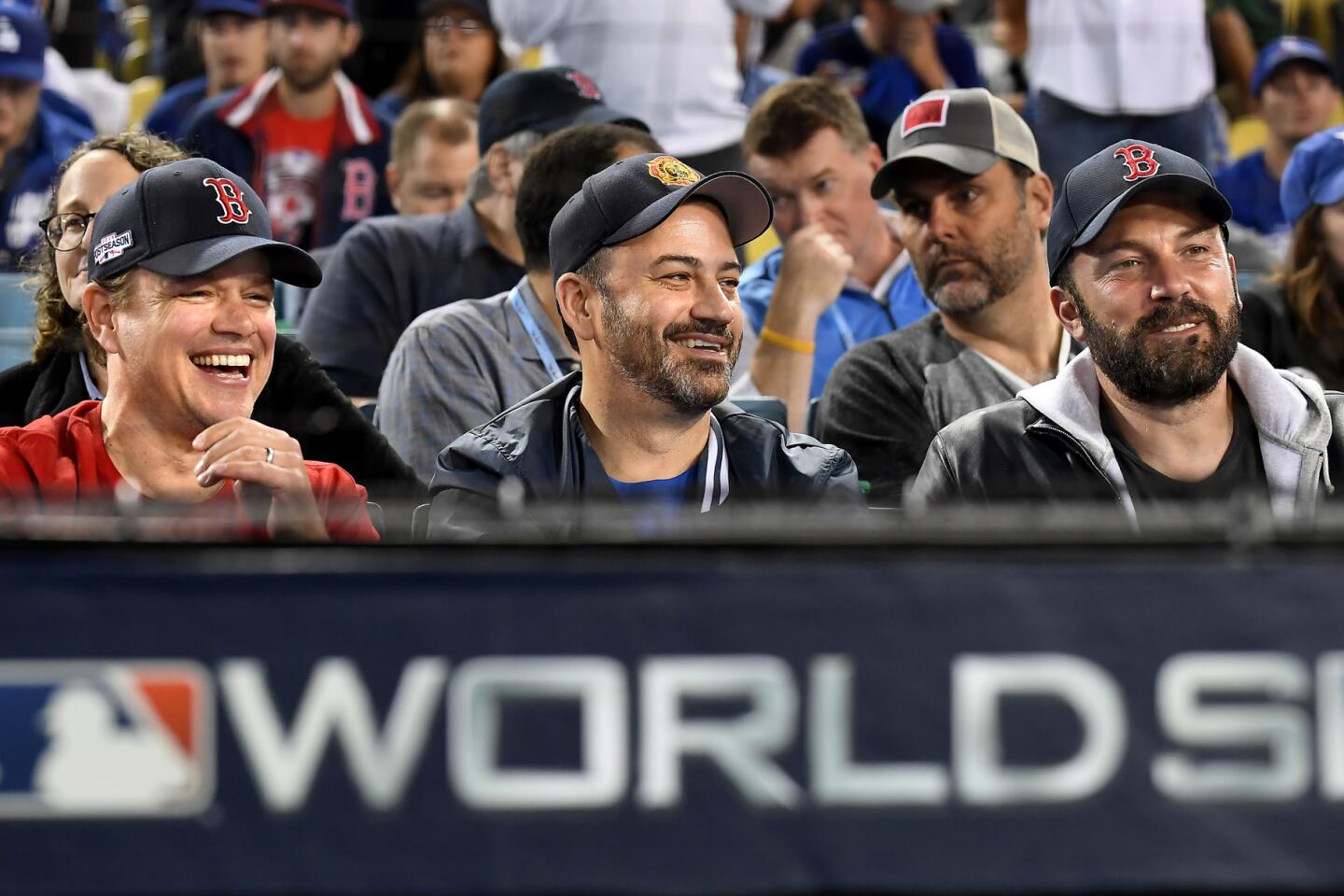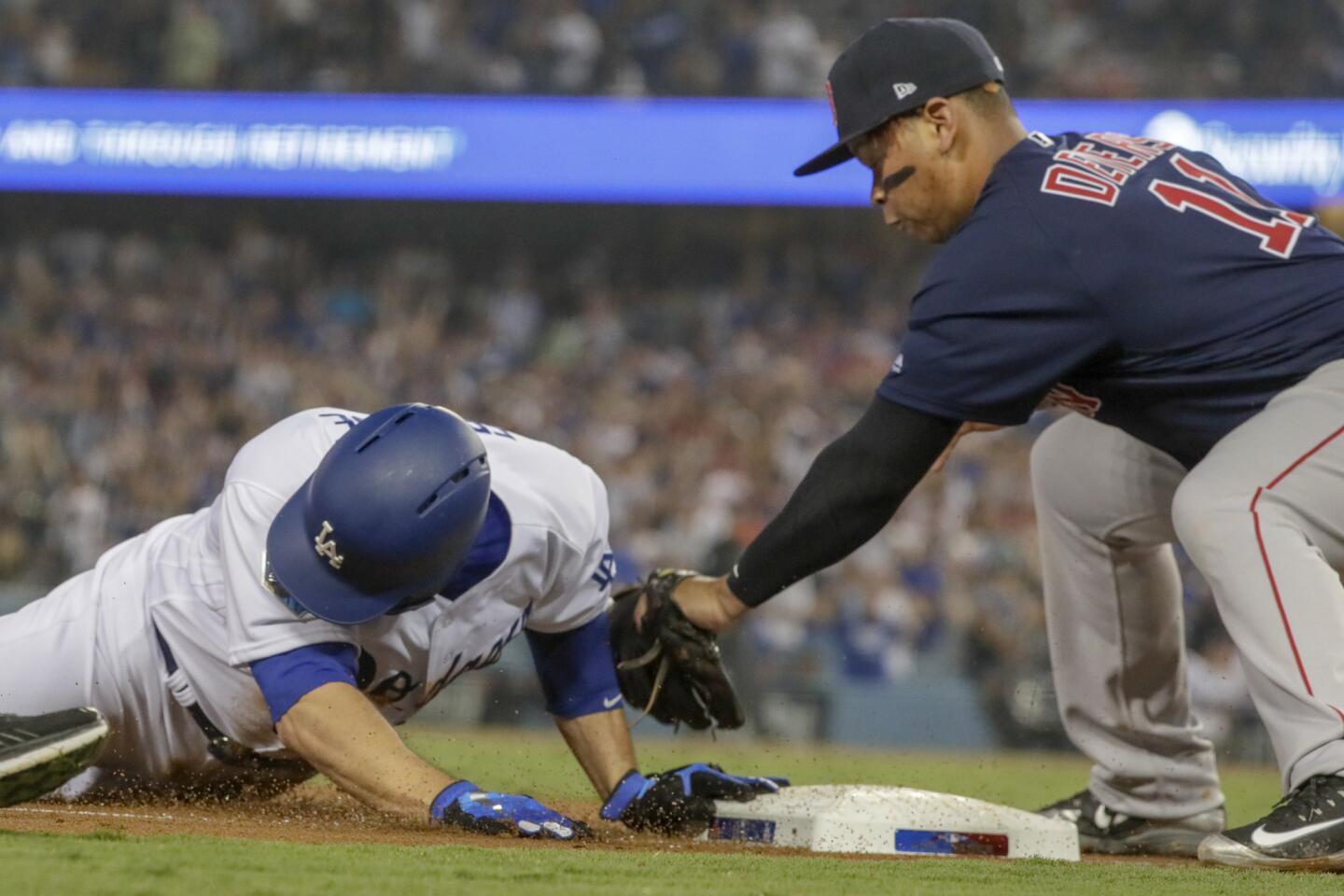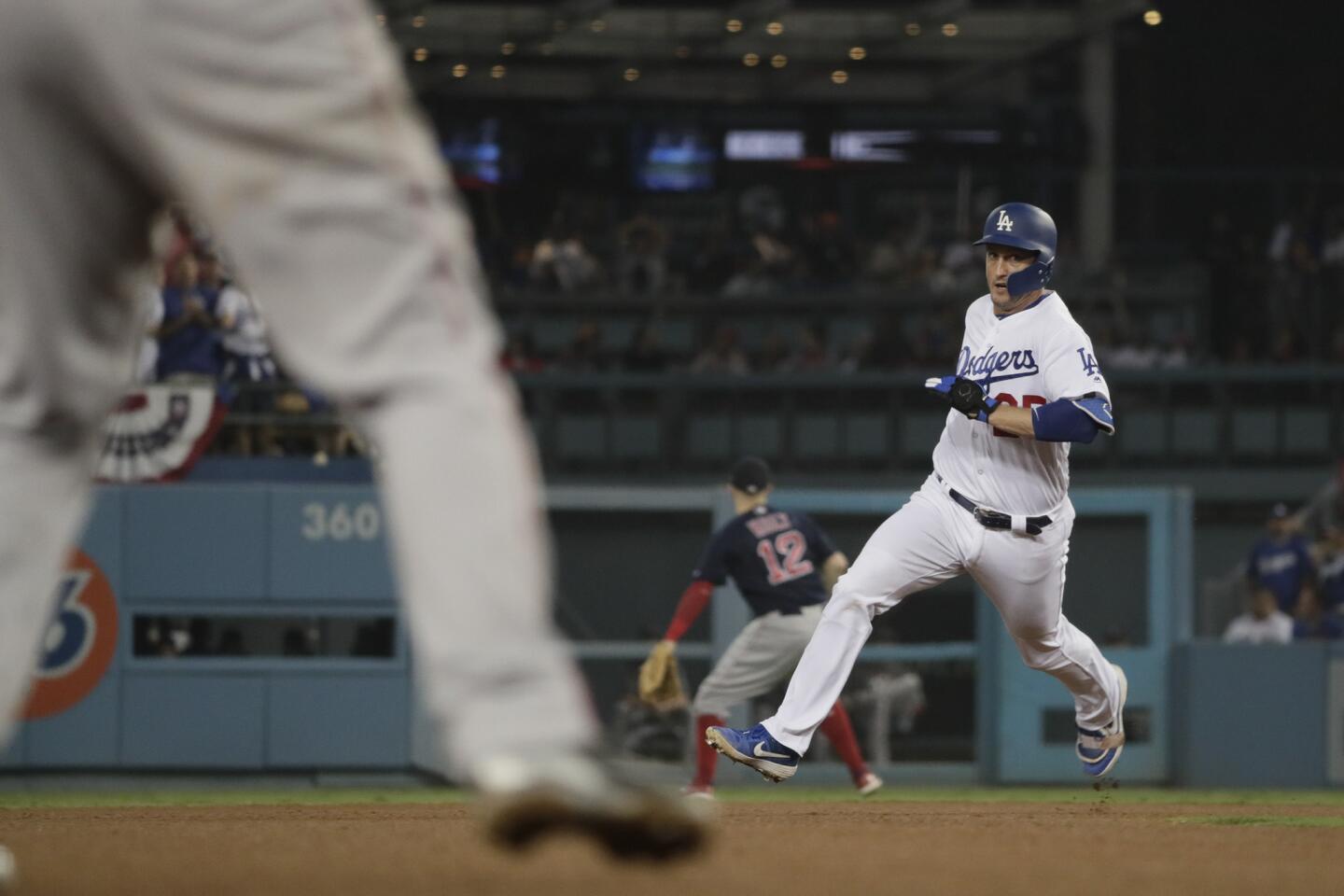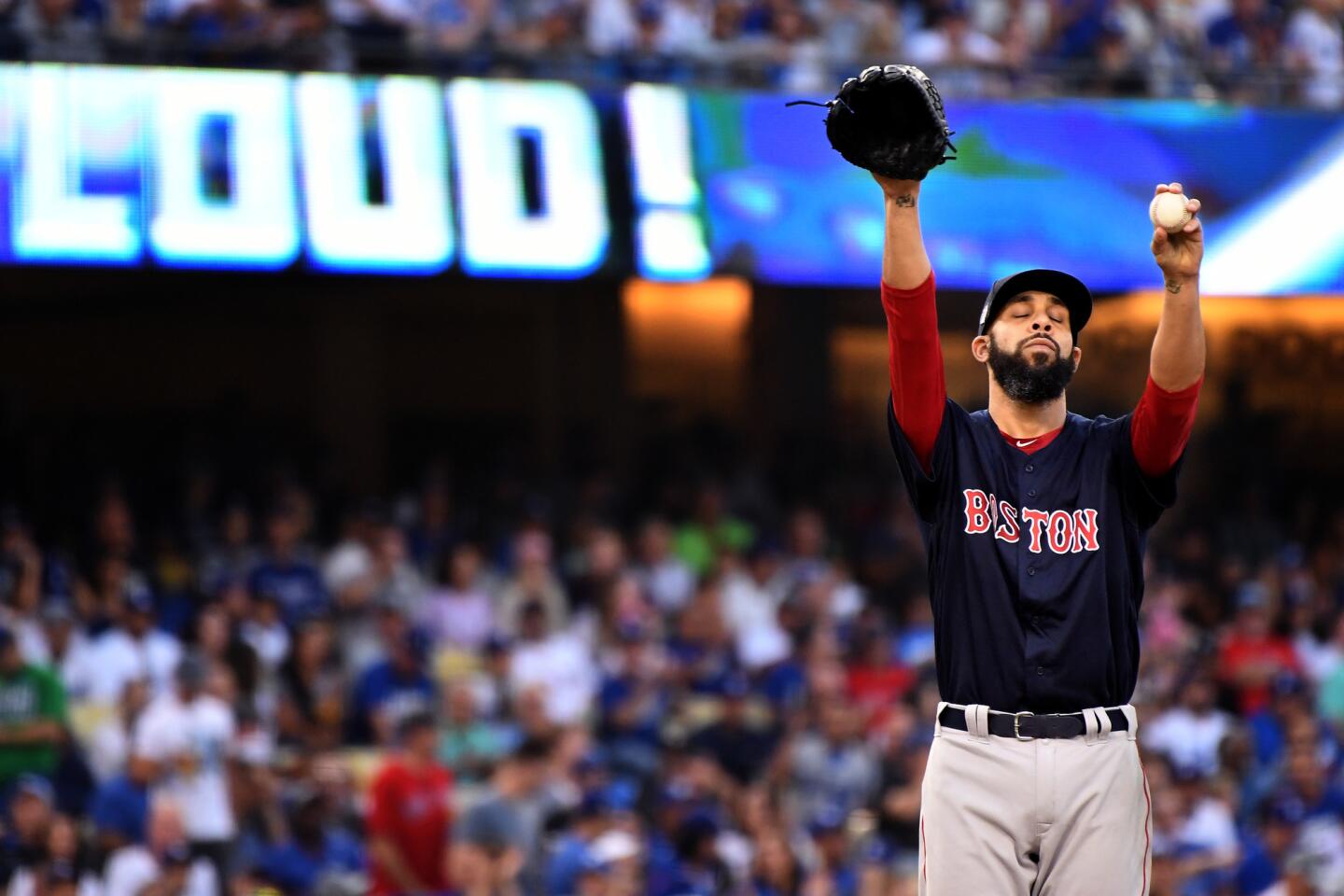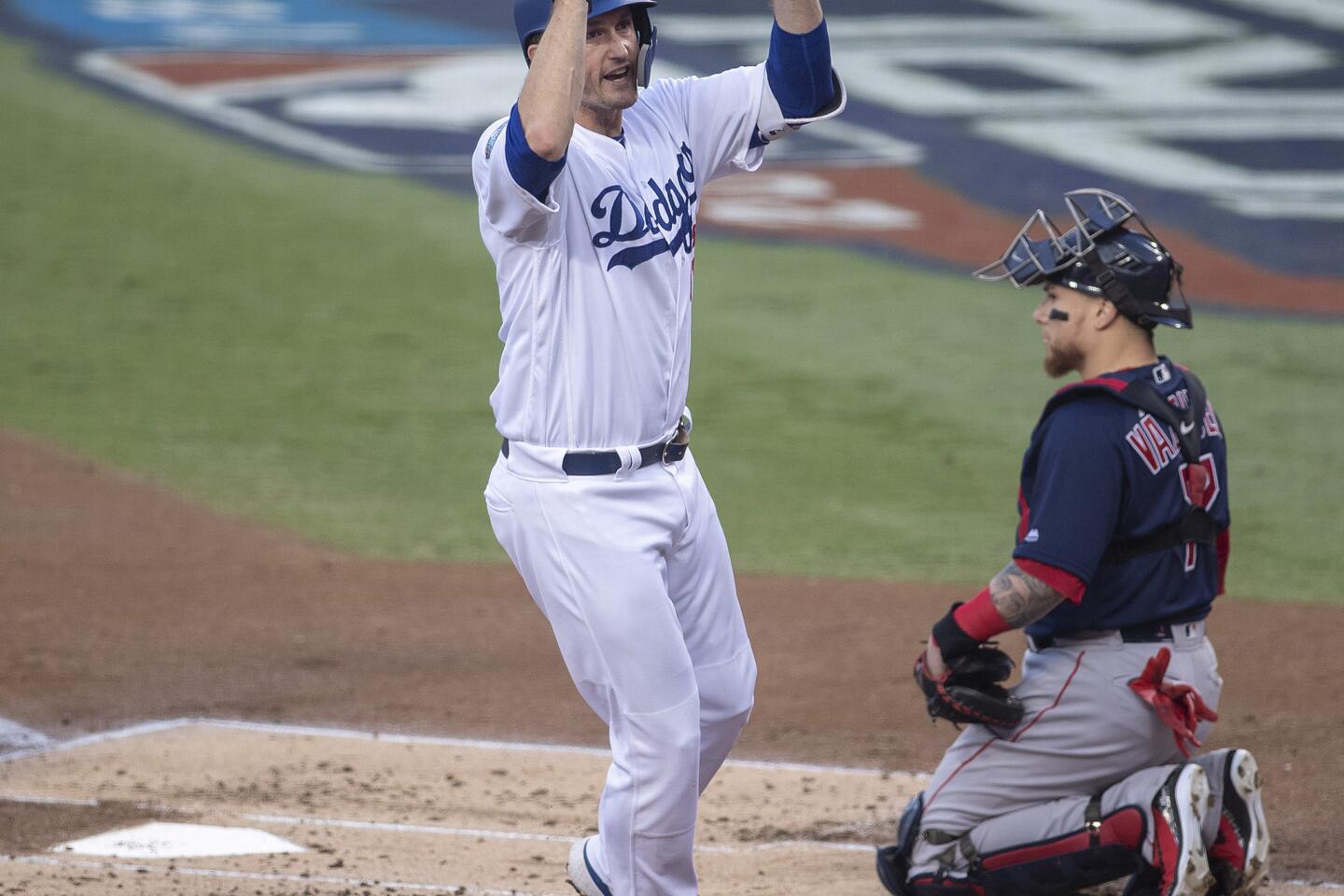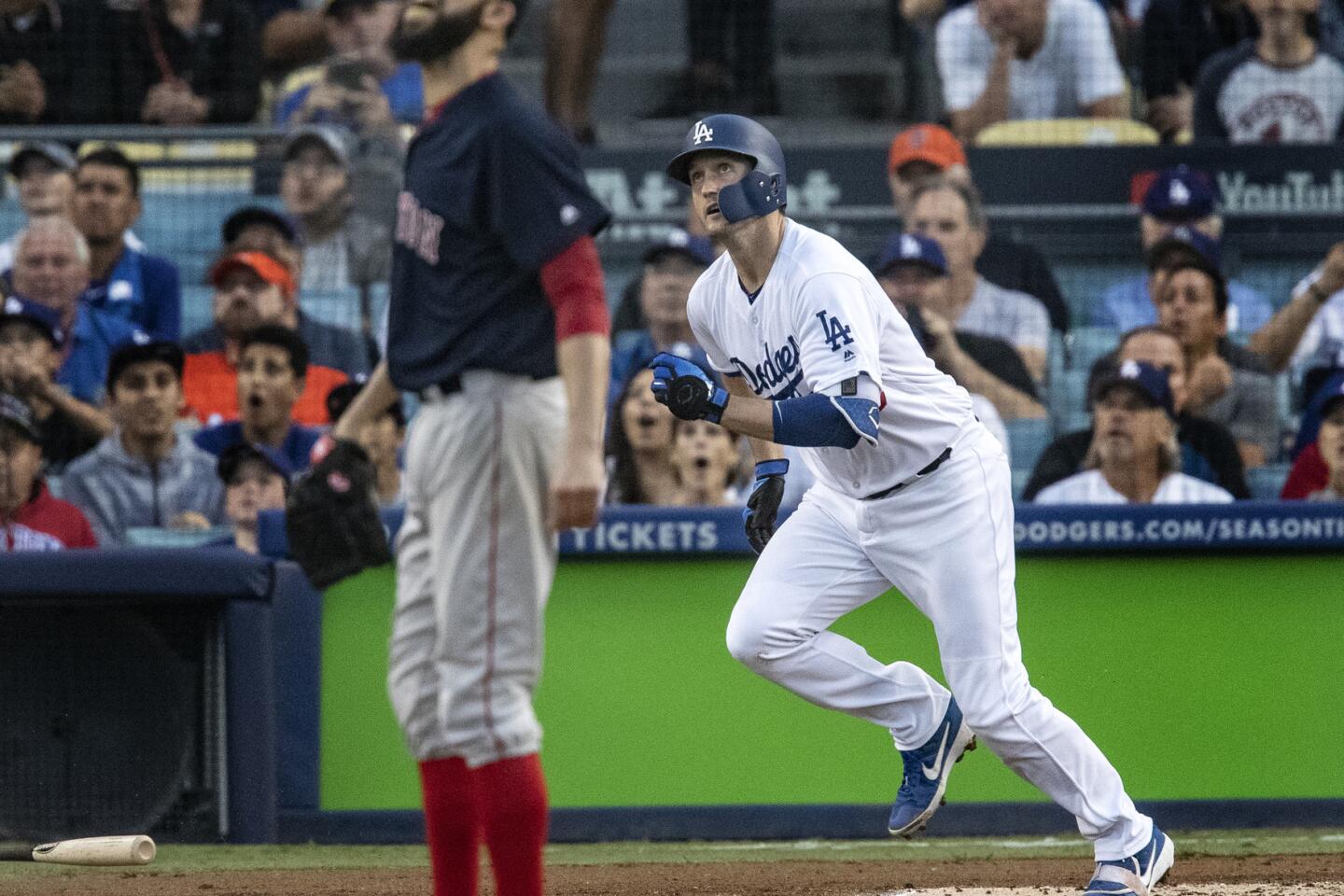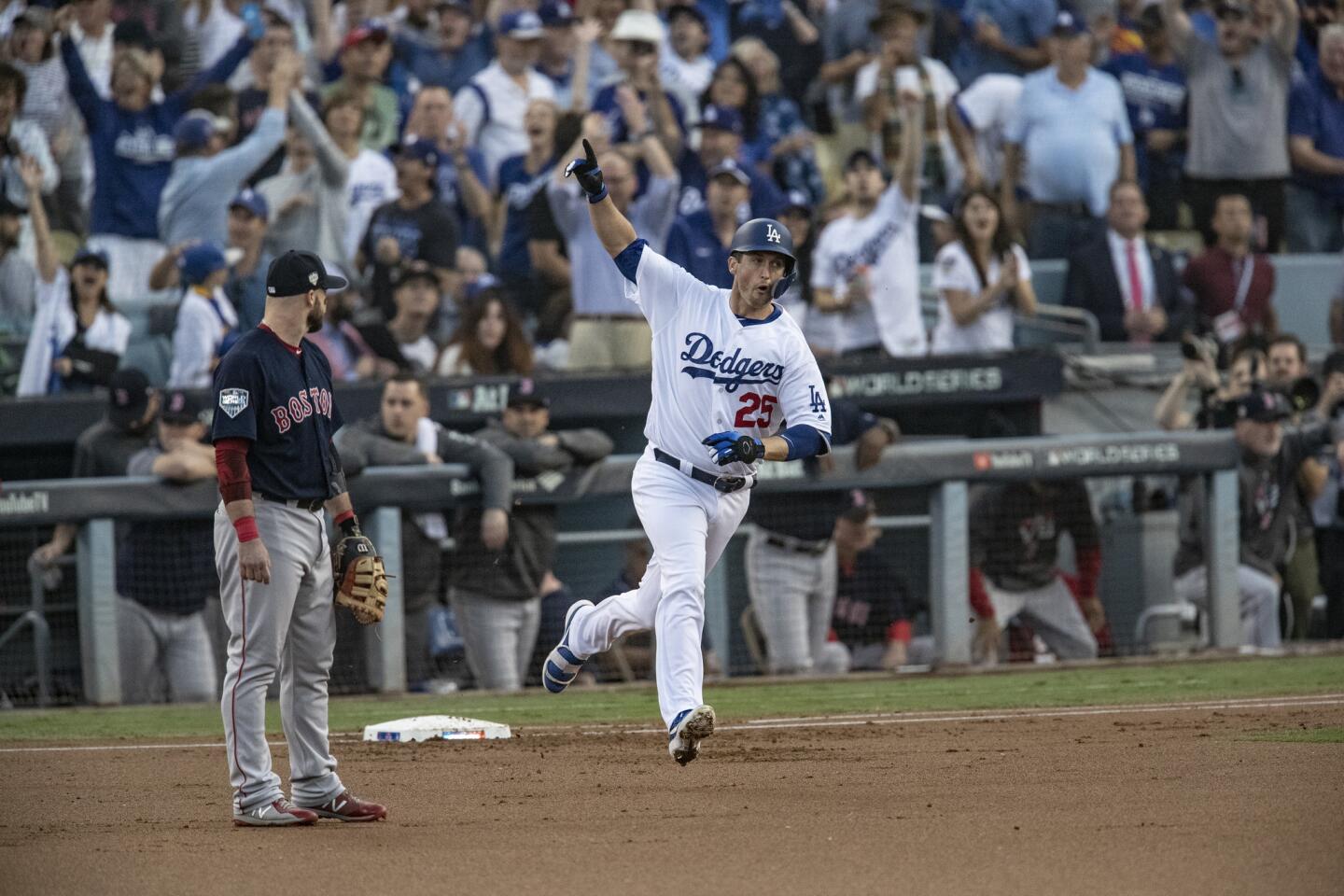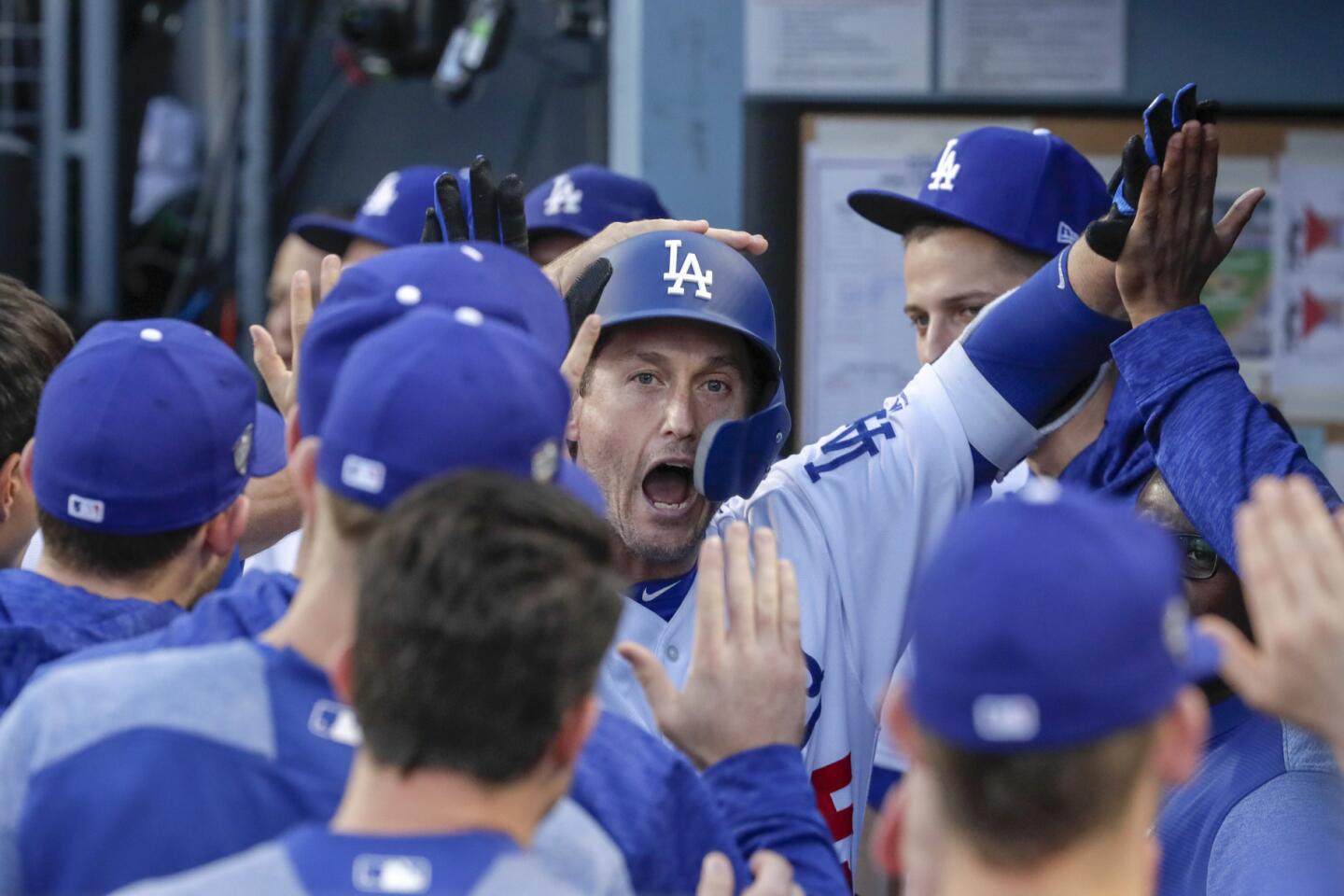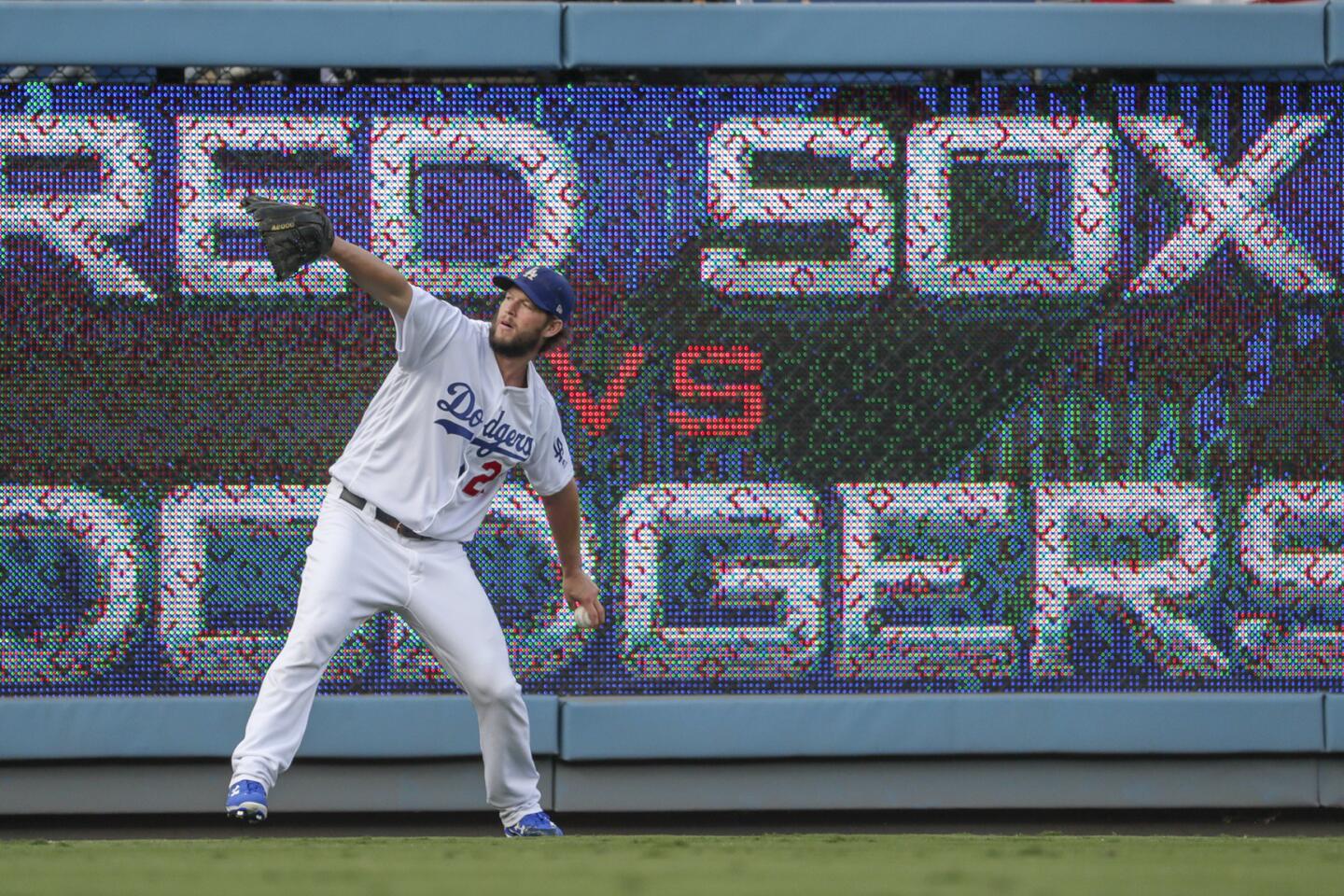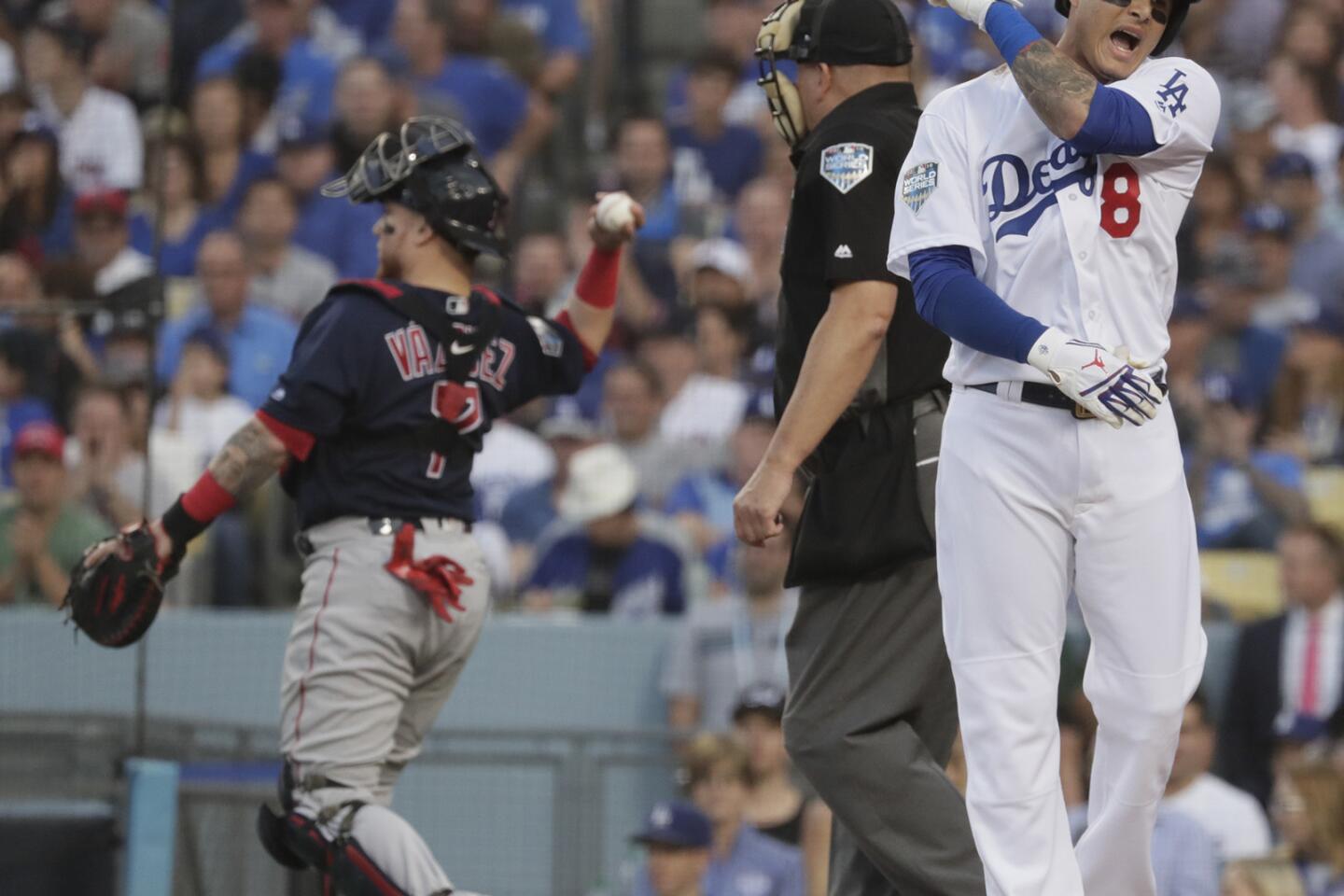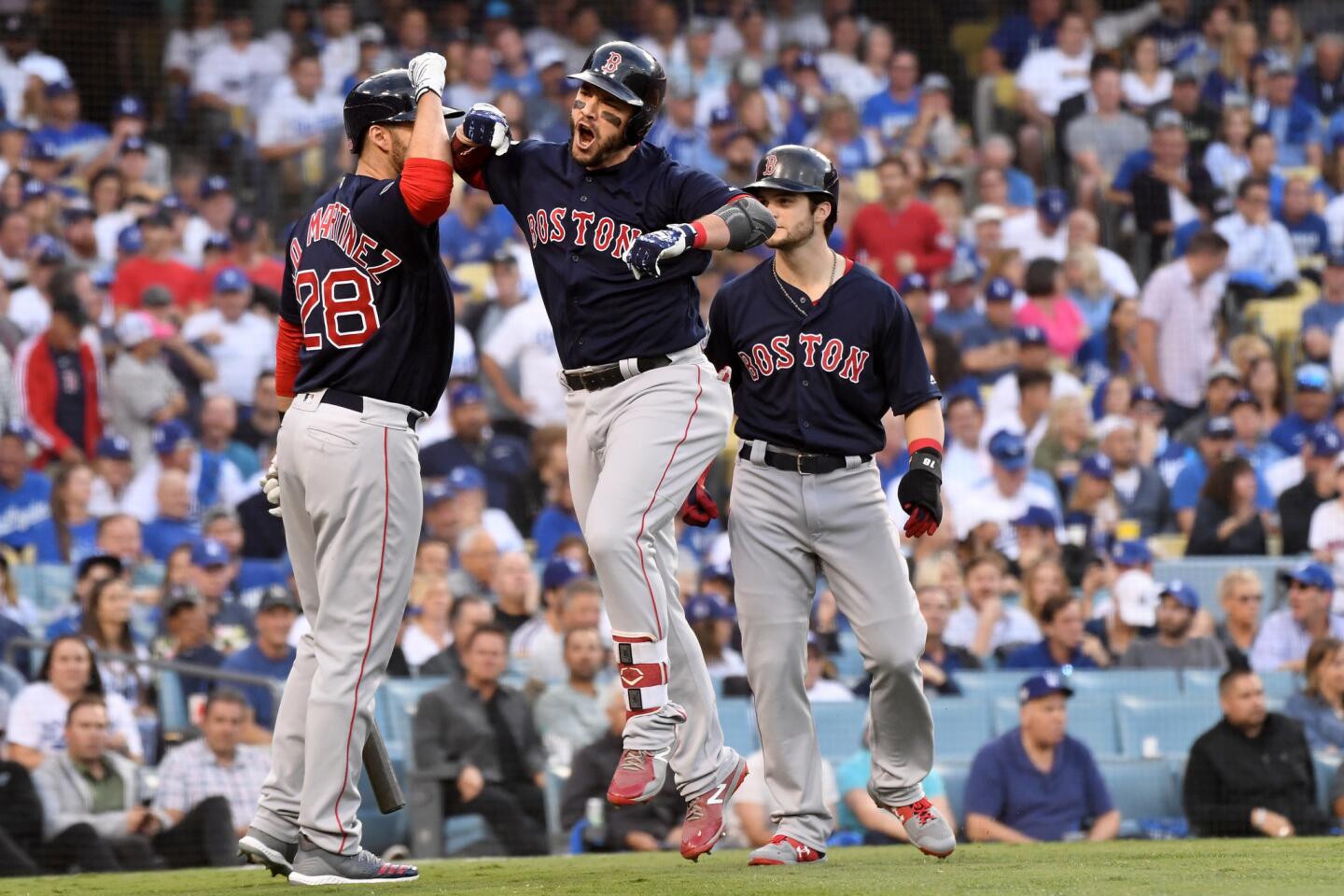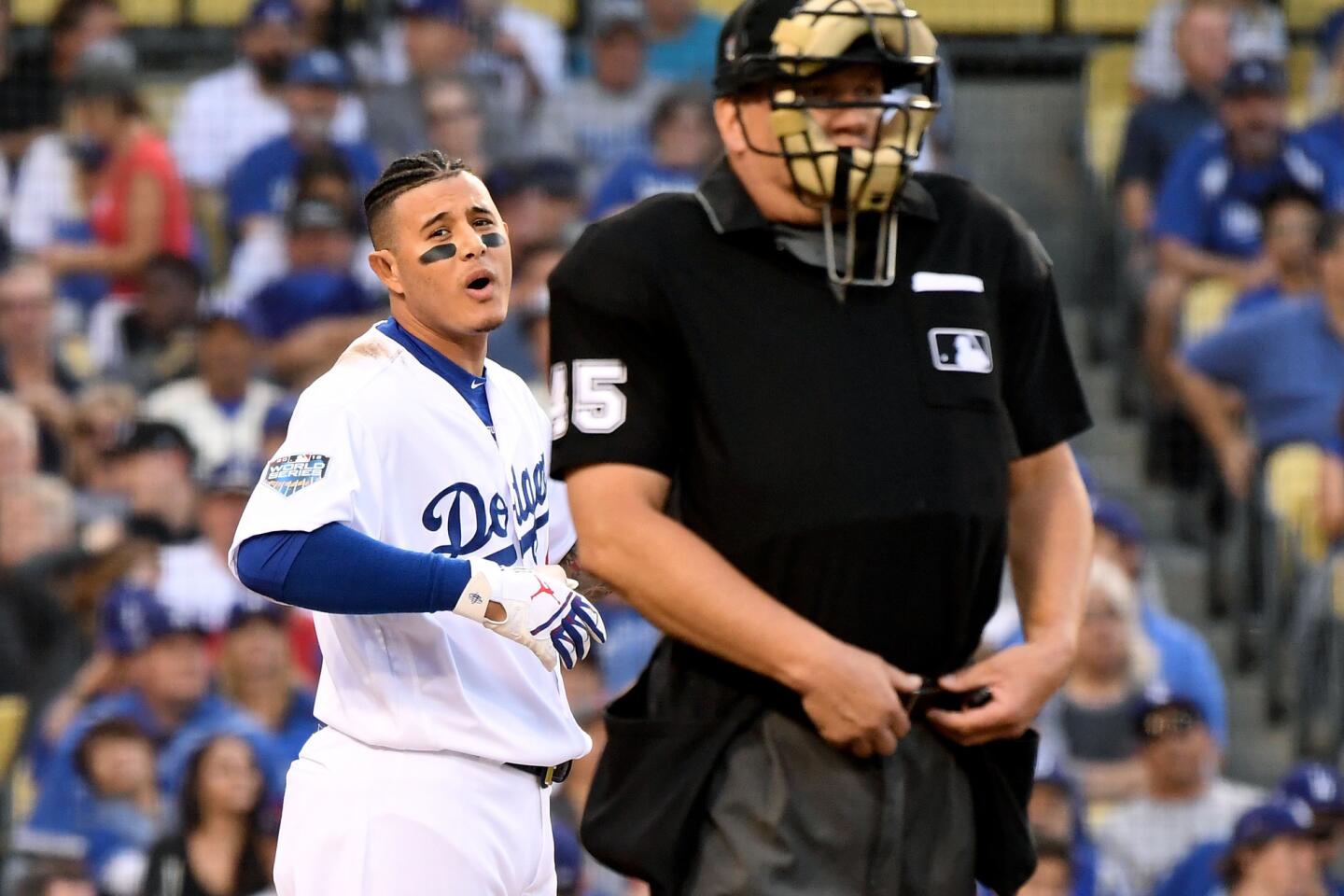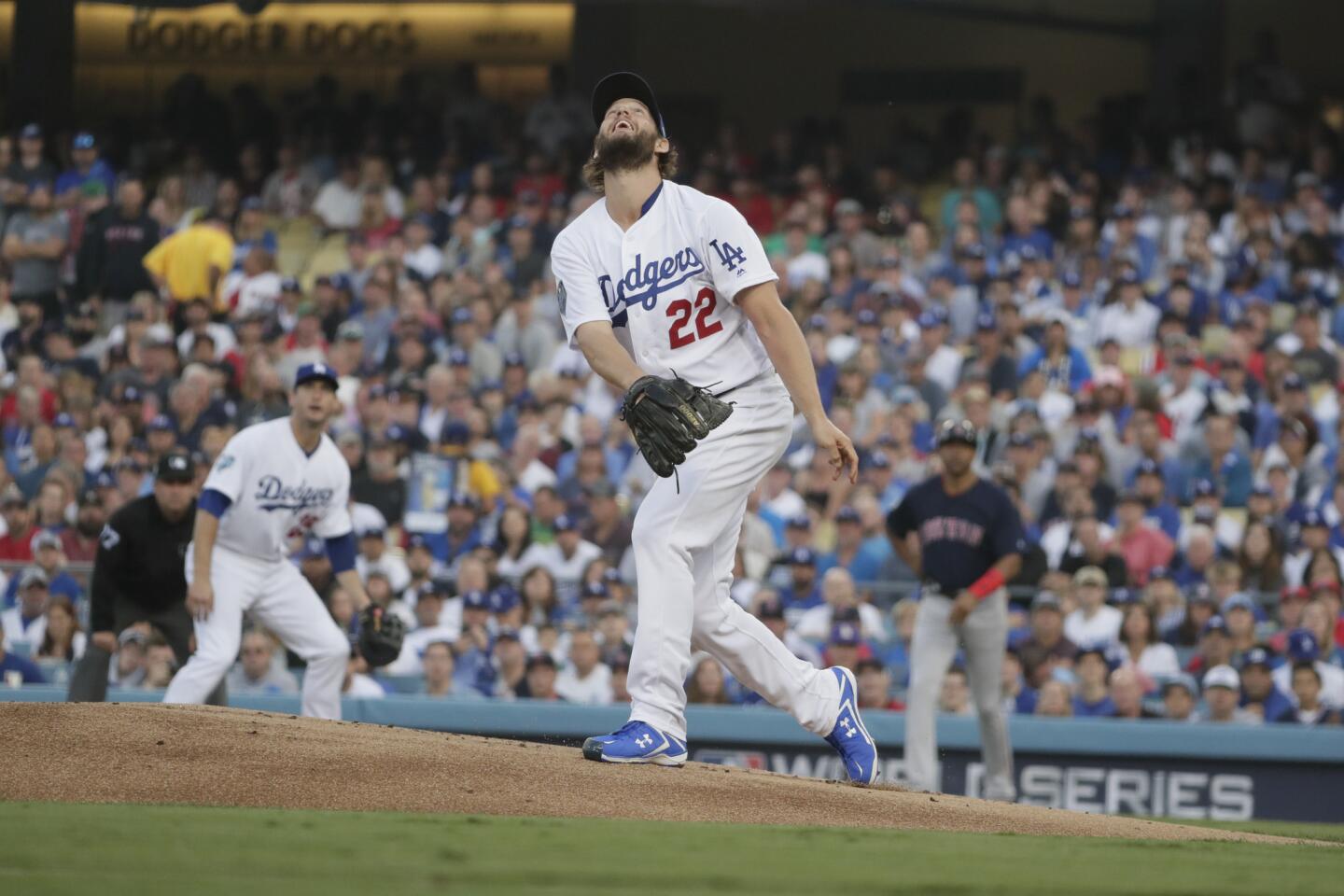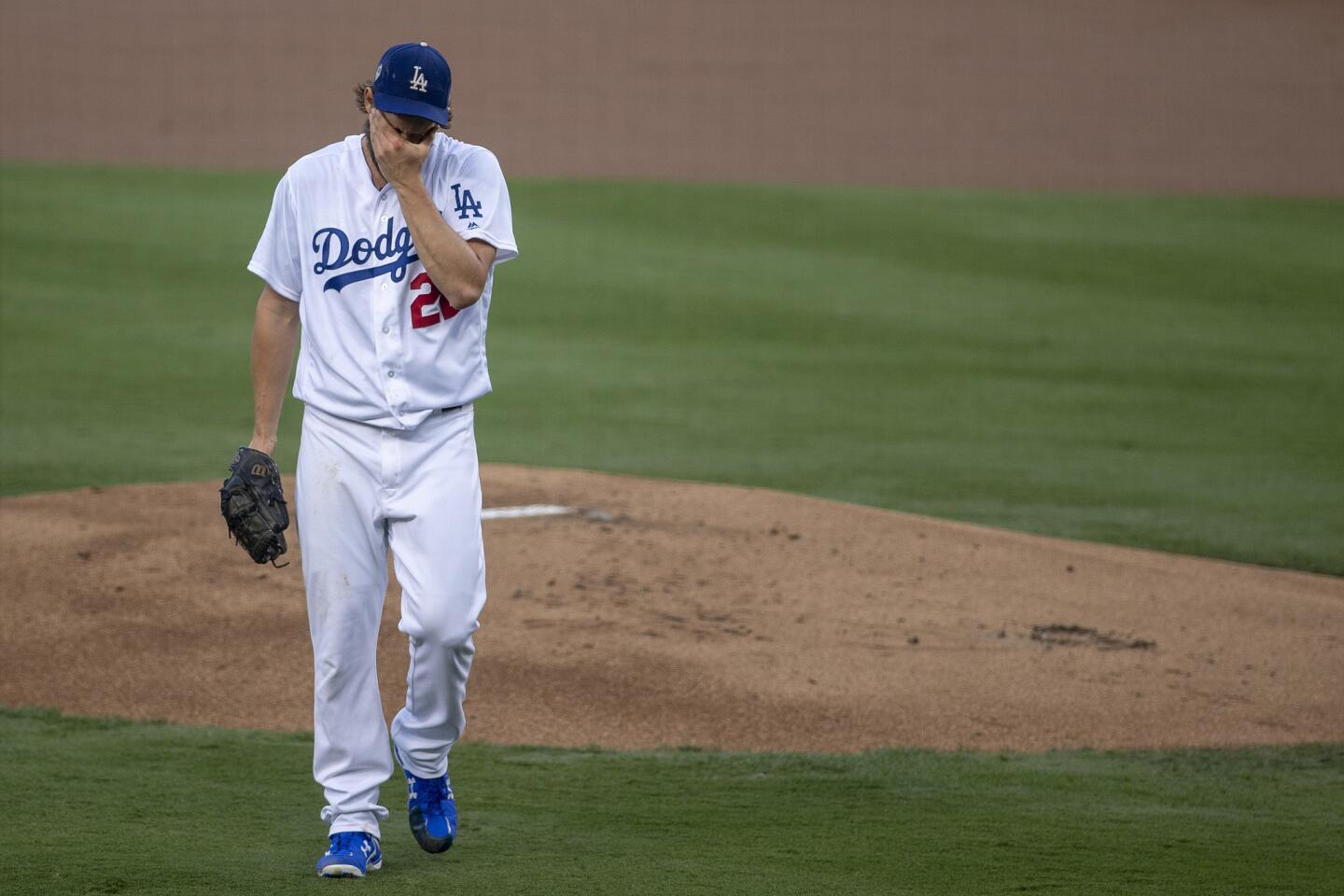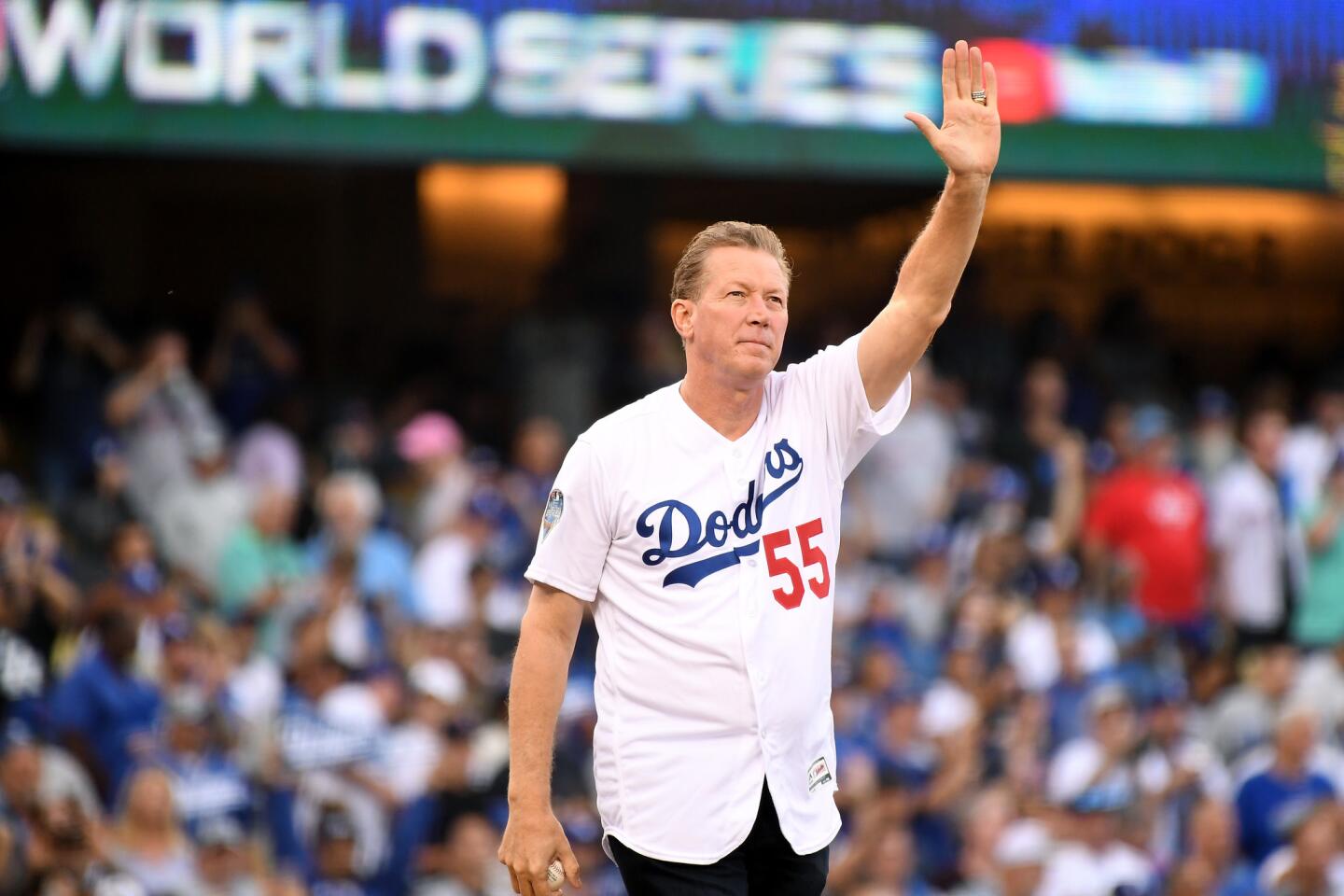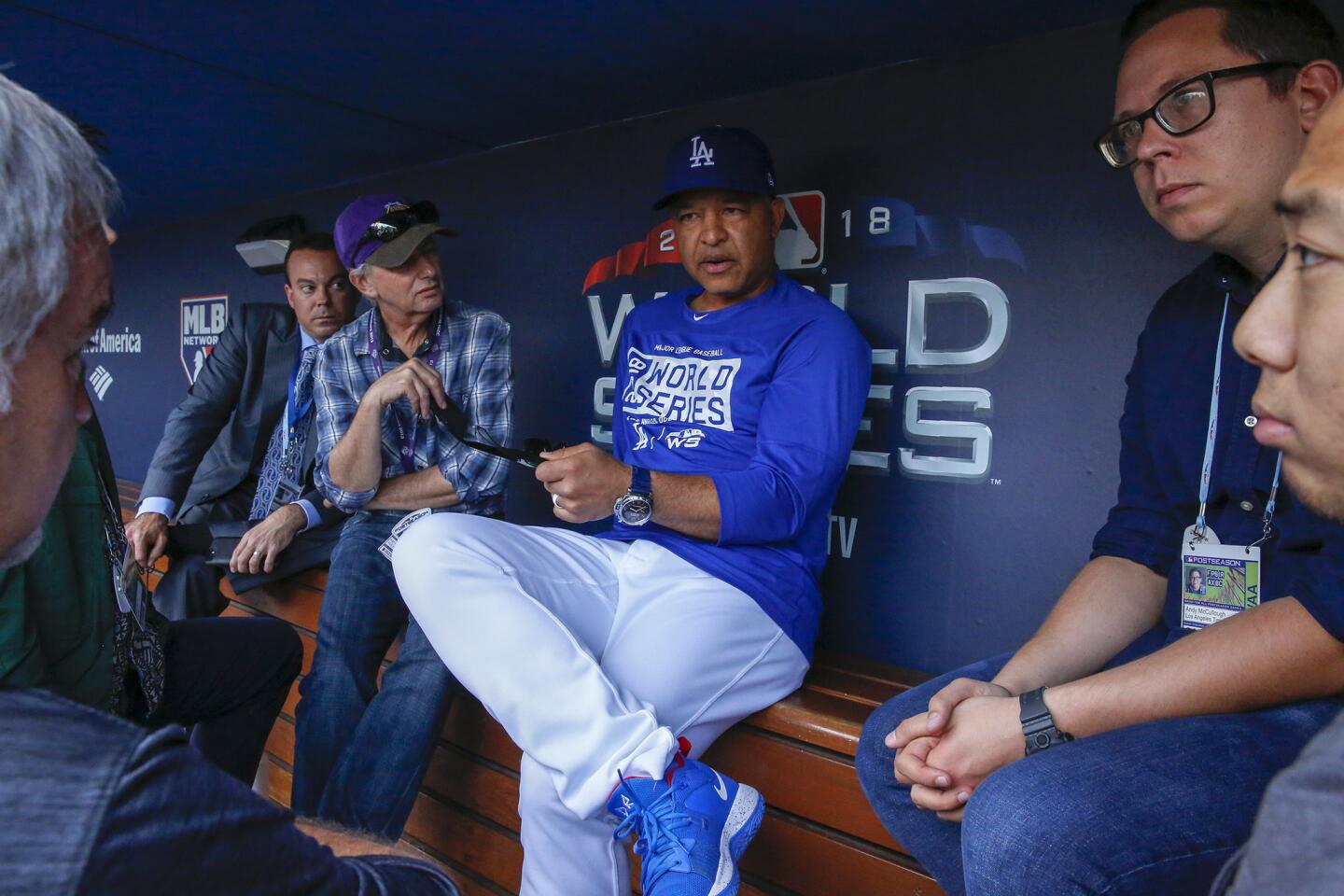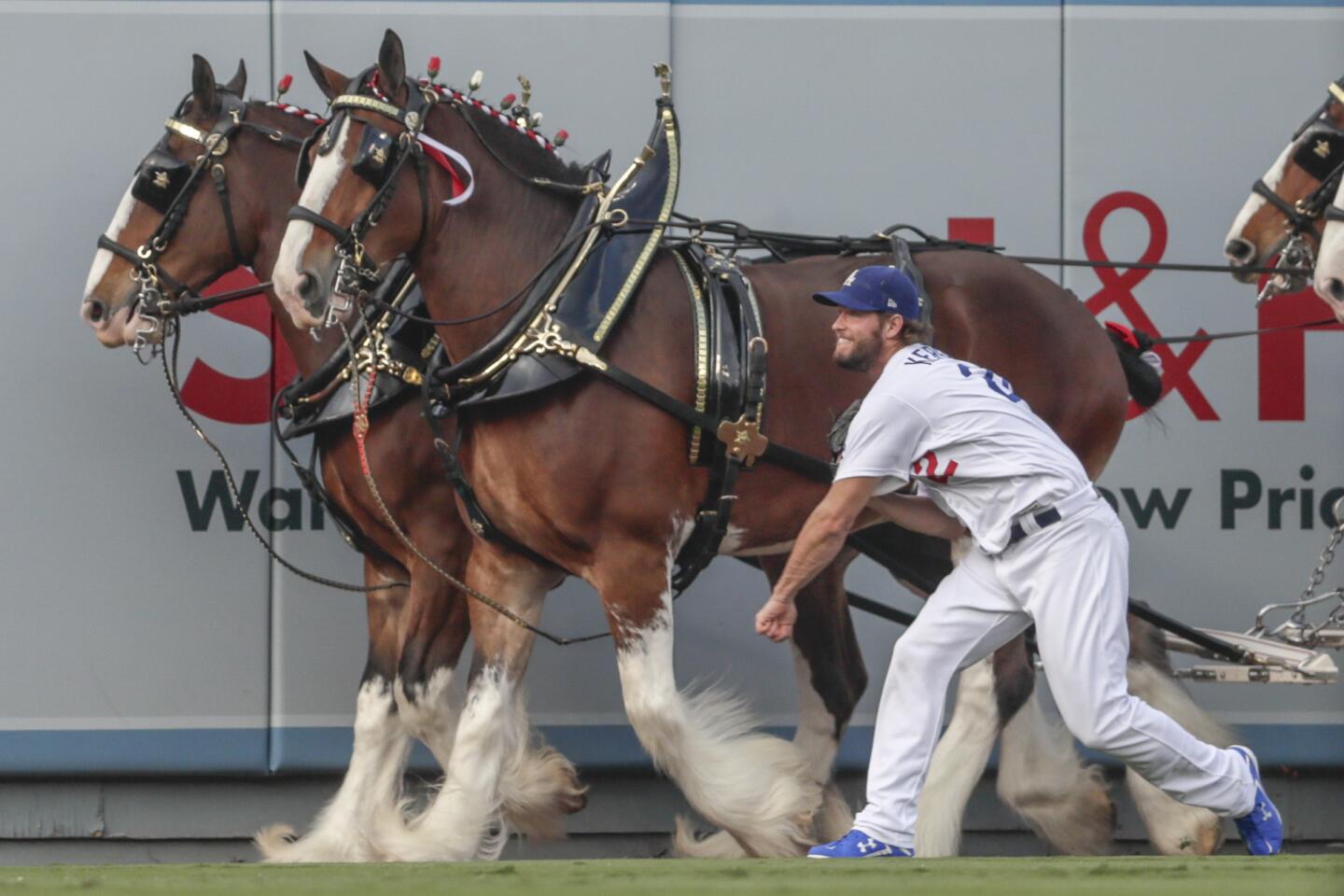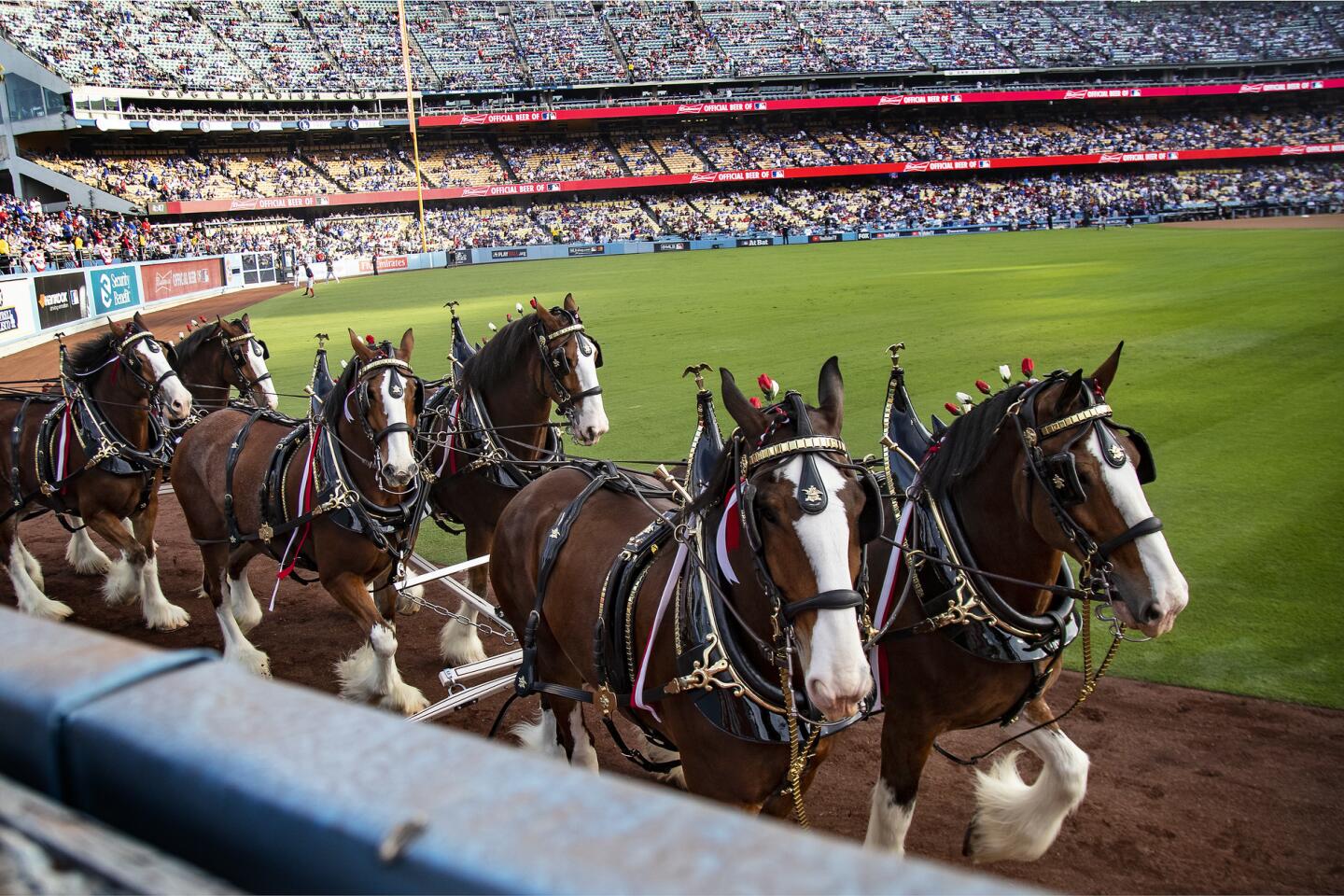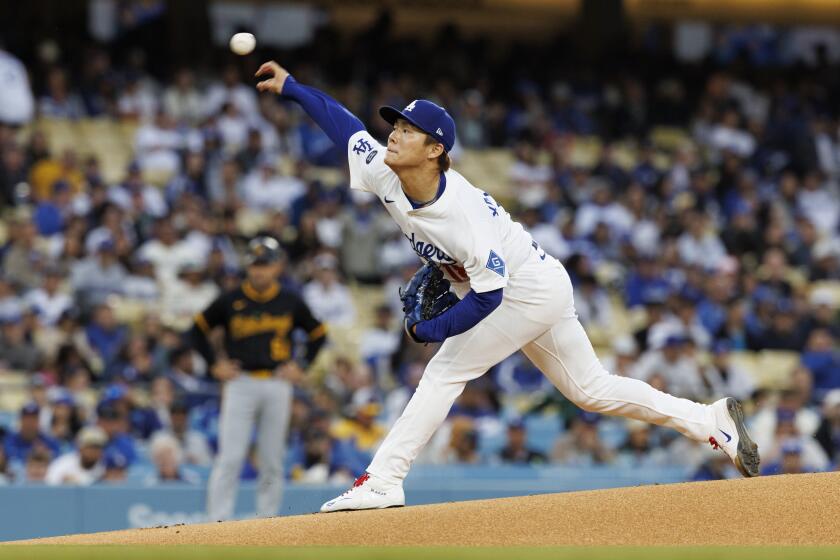Red Sox silence the Dodgers’ offense to claim the World Series championship
- Share via
The bell tolled for the 2018 Dodgers at 8:17 p.m. on Sunday, as Manny Machado fell to a knee in the batter’s box after the final, futile swing of the season. A championship drought extended to a 30th year after Game 5 of the World Series, a 5-1 victory by the Boston Red Sox that lacked the turmoil of the previous night and the exhaustion of the previous season. For the second year in a row, an opposing team spilled champagne and lifted the Commissioner’s Trophy in Dodger Stadium as the hosts trudged toward the offseason.
The procession was brief Sunday. A few Dodgers lingered in the dugout as the Red Sox swarmed the field. Manager Dave Roberts met with the players and commended them for their accomplishments. He singled out Clayton Kershaw, who gave up four runs in the loss and can become a free agent this week, for his contributions to the organization. The players packed their gear into boxes and said goodbyes more weary than tearful.
“Back-to-back years, falling short in the World Series, it’s brutal,” third baseman Justin Turner said. “We’ve just got to try to hang our hats on all the good things that happened this year.”
Left for dead in May, cast adrift in August, the Dodgers rallied to capture a sixth consecutive National League Division title and a second consecutive NL pennant. Yet, these games with the Red Sox did not reveal the flaws of the roster. The World Series merely reaffirmed them: Shaky contributions from star pitchers like Kershaw and closer Kenley Jansen, an offense prone to extended slumber and a bullpen that could double as a tinderbox.
The thing about confidence — the lifeblood of any athlete and the quality prized above all among the Dodgers — is it looks irrational only in retrospect. In the heat of the arena, before the scores are settled and the season decided, a team can sneer at concerns voiced by the public, questions raised by the media and challenges brought by their opponents. Confidence looks like arrogance only in the wake of defeat.
The Dodgers were rewarded for their confidence, and their talent, in the first two rounds against Atlanta and Milwaukee. Their journey was spoiled by the Red Sox, a 108-win team that flattened the defending-champion Houston Astros en route to the World Series. Once there, Boston pounced on the mistakes made by the Dodgers, including turning a four-run deficit in Game 4 into a Series-swinging rout after Roberts removed Rich Hill in the midst of a one-hit outing.
“We could’ve done more and won the championship, but it got out of our hands,” outfielder Yasiel Puig said in Spanish. “We practically gifted it to Boston, which is a great team. We did things we shouldn’t have done. We made bad decisions.”
The defeat ushered in an offseason of uncertainty. The team could part ways with impending free agents like Machado, catcher Yasmani Grandal and Game 2 starter Hyun-Jin Ryu. Kershaw has never entered free agency. Roberts does not have a guaranteed contract for 2019. Though the Dodgers have an option on him for next season, Roberts will enter the offseason with a significant portion of fans braying for his ouster.
“My plan is to manage the Dodgers,” Roberts said. “I love the city. I love the organization, everything that it’s about. And I love the high expectations. That’s the way it should be. I can always get better.”
The final game of the 2018 season offered few chances for Roberts to atone for Game 4. Nor did it allow Kershaw to rewrite the story of his season, in which his performance fell shy of his elevated standard.
After injuring his back and his left shoulder in the first half of the year, Kershaw struggled to generate the desired velocity on his fastball and the required break on his slider. The lack of differentiation between the two pitches plagued him Sunday.
The game opened with a two-run blast from first baseman Steve Pearce, who was selected the Series’ most valuable player. He crushed a thigh-high slider. It was the first of three home runs surrendered by Kershaw. He gave up solo shots to outfielder Mookie Betts in the sixth inning (89-mph slider) and outfielder J.D. Martinez in the seventh (90-mph fastball).
“There’s only one team that can win, and we know that,” Kershaw said. “But it just hurts worse when you make it all the way, and get second place.”
The offense limped into the offseason without much protest. David Freese attempted to awaken them with a leadoff home run in the first inning against left-hander David Price. Gifted a triple after Martinez misplayed a ball in the third, Freese was stranded when Turner grounded out and Enrique Hernandez popped up.
The hitters stumbled in clutch spots all season. Without men on base, the Dodgers boasted a .791 on-base-plus-slugging percentage, the most productive in baseball. In situations classified as high leverage by FanGraphs, the OPS was .685, 23rd in the majors. That quality did not disappear during the postseason. The Dodgers batted .200 with runners in scoring position against Boston. The Red Sox hit .353.
In the eighth, when Price departed after a leadoff walk, manager Alex Cora inserted reliever Joe Kelly. Unlike the Dodgers relievers in Game 4, Kelly did not set the game ablaze. He struck out Matt Kemp, Joc Pederson and Cody Bellinger to vanquish the threat, leaving the last three outs for ace Chris Sale.
To see Cora execute a smooth transition into the bullpen was a caustic sight for the Dodgers. Their relief corps capsized in the Series. No reliever bore more responsibility than Ryan Madson, who allowed all seven of the runners he inherited to score and served up a momentum-tilting, three-run home run in Game 4.
The presence of Madson in crucial situations underscored the team’s hubris regarding their internal depth. The mediocrity of the bullpen was far from a secret. At the All-Star break, Dodgers relievers ranked 13th in earned-run average, 16th in fielding-independent ERA (FIP) and 23rd in home runs given up per nine innings. The unit rotted from the top: By the July 31 trade deadline, Jansen had already surrendered a career-high six home runs and would give up seven more.
The Dodgers made only cosmetic changes to the bullpen. They were willing to sacrifice assets for Machado, but they could not find significant relief upgrades. In August, Madson arrived from Washington, lugging a 5.28 ERA, with recent postseason experience that consisted of giving up titanic home runs for the Kansas City Royals in 2015.

Los Angeles Dodgers utlity player Cody Bellinger talks about the emotions of losing a World Series.
Madson added to the lowlight reel in 2018. So did Jansen, who blew a save opportunity in Game 2 of the 2017 Series. He bungled save opportunities in consecutive games against Boston. The first ushered in the 18-inning nightmare of Game 3. The second led to a backbreaking defeat.
“We did our best,” Jansen said. “We gave all we got. Definitely I feel disappointed. It definitely stings.”
There was little else to say. The flaws were there, even if it took an elite team from Boston to expose them.
How will history remember the 2018 Dodgers? They were hard to love, but hard to beat — until the end. They possessed enough talent to defeat the Red Sox, but failed to execute.
“You have to realize that we are a really good team to get to the World Series two years in a row,” Kershaw said. “It might not be a personnel thing. It might just be a ‘Play better’ thing.”
Twitter: @McCulloughTimes
More to Read
Are you a true-blue fan?
Get our Dodgers Dugout newsletter for insights, news and much more.
You may occasionally receive promotional content from the Los Angeles Times.
